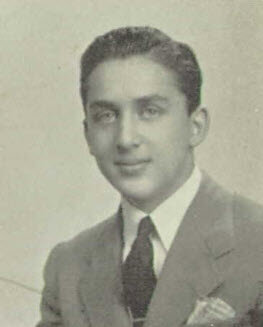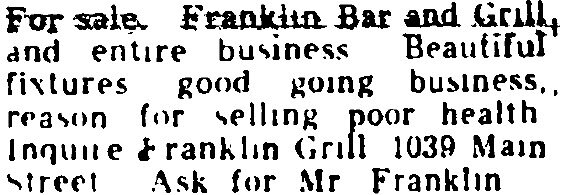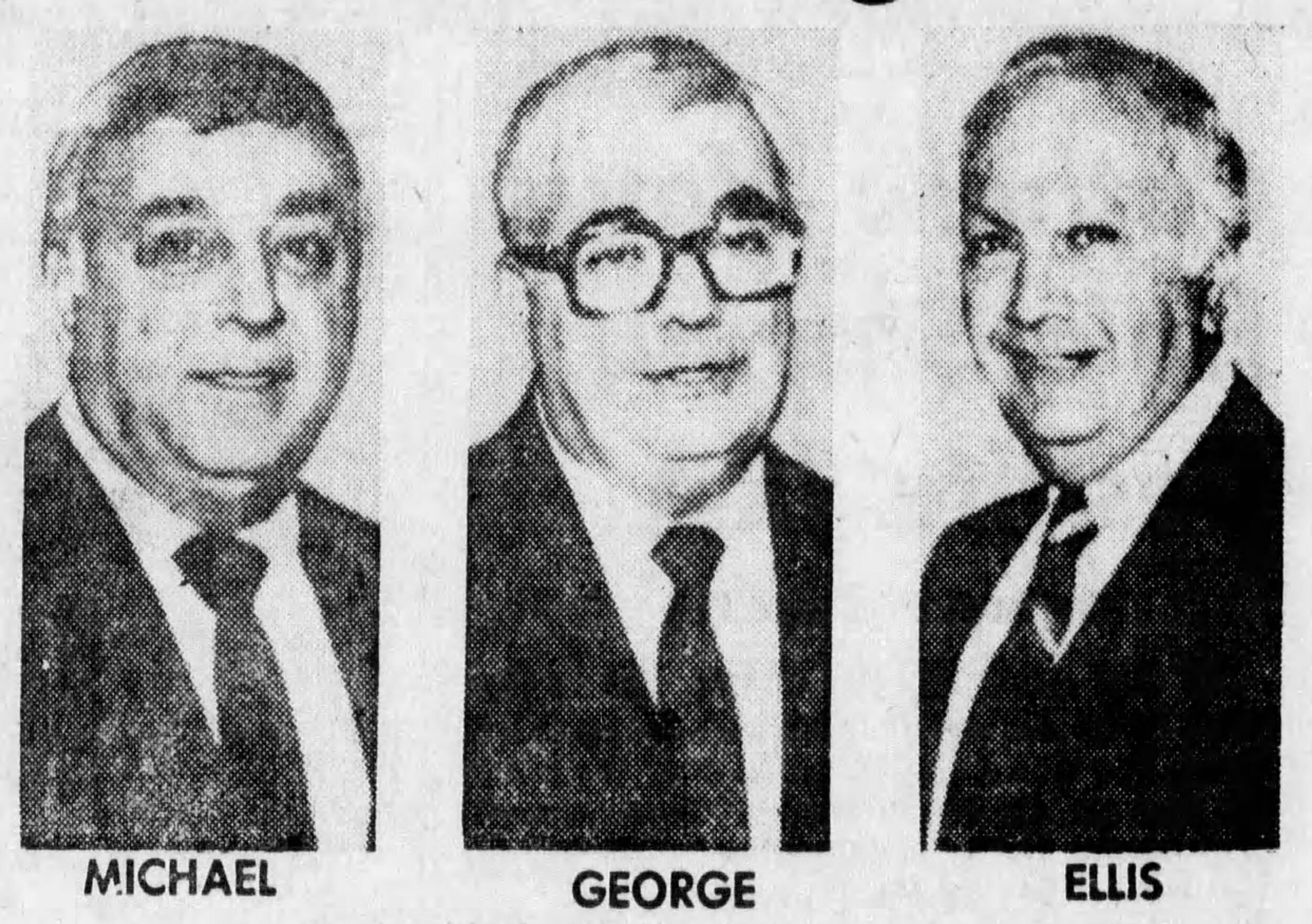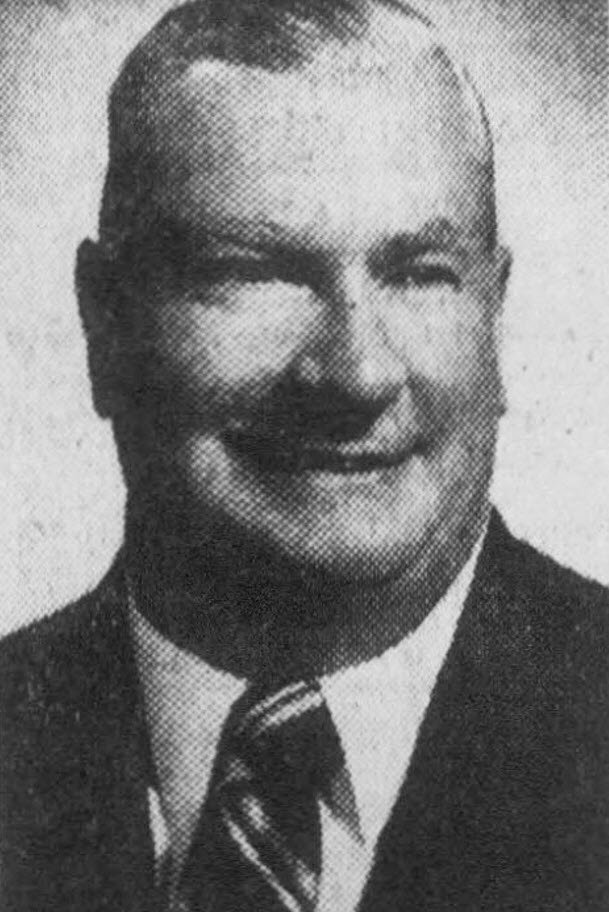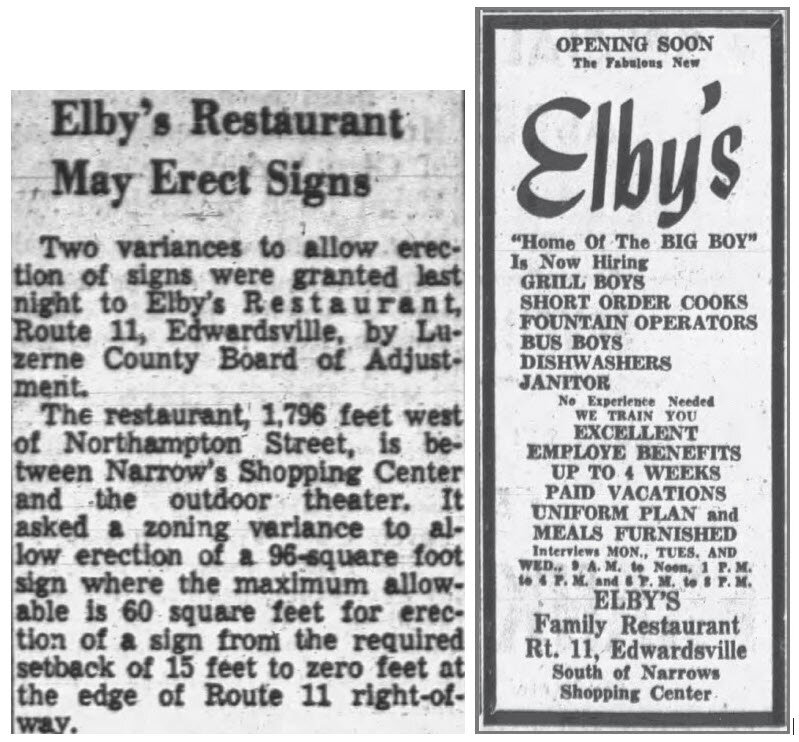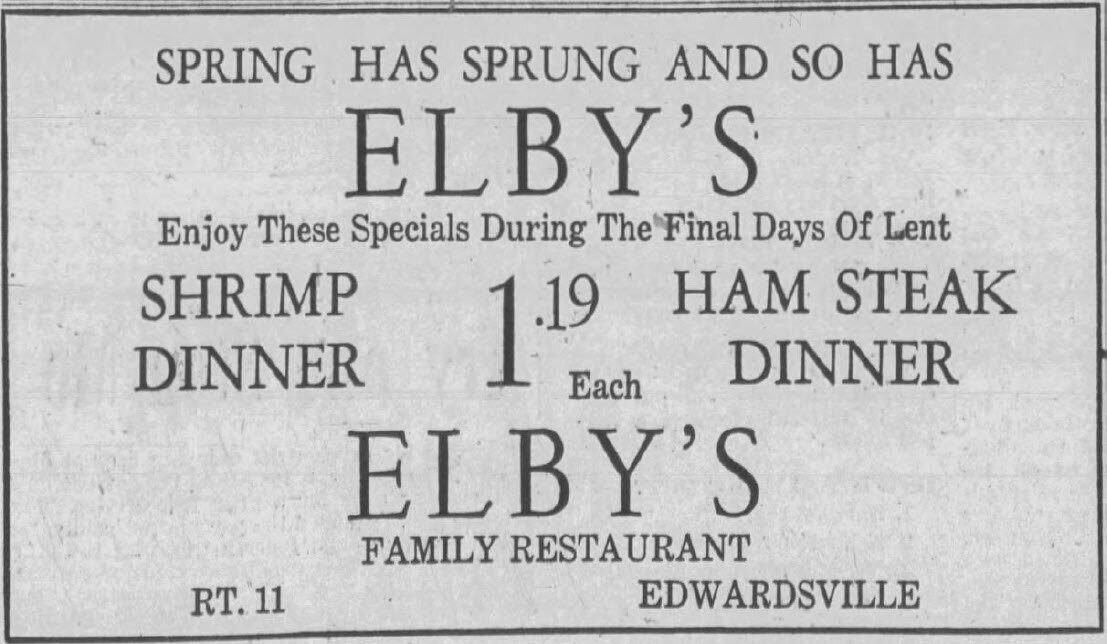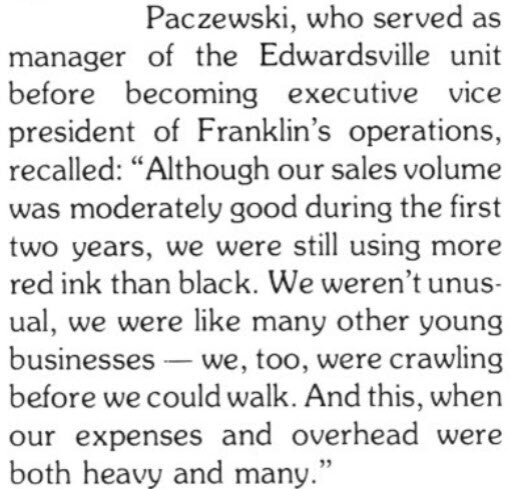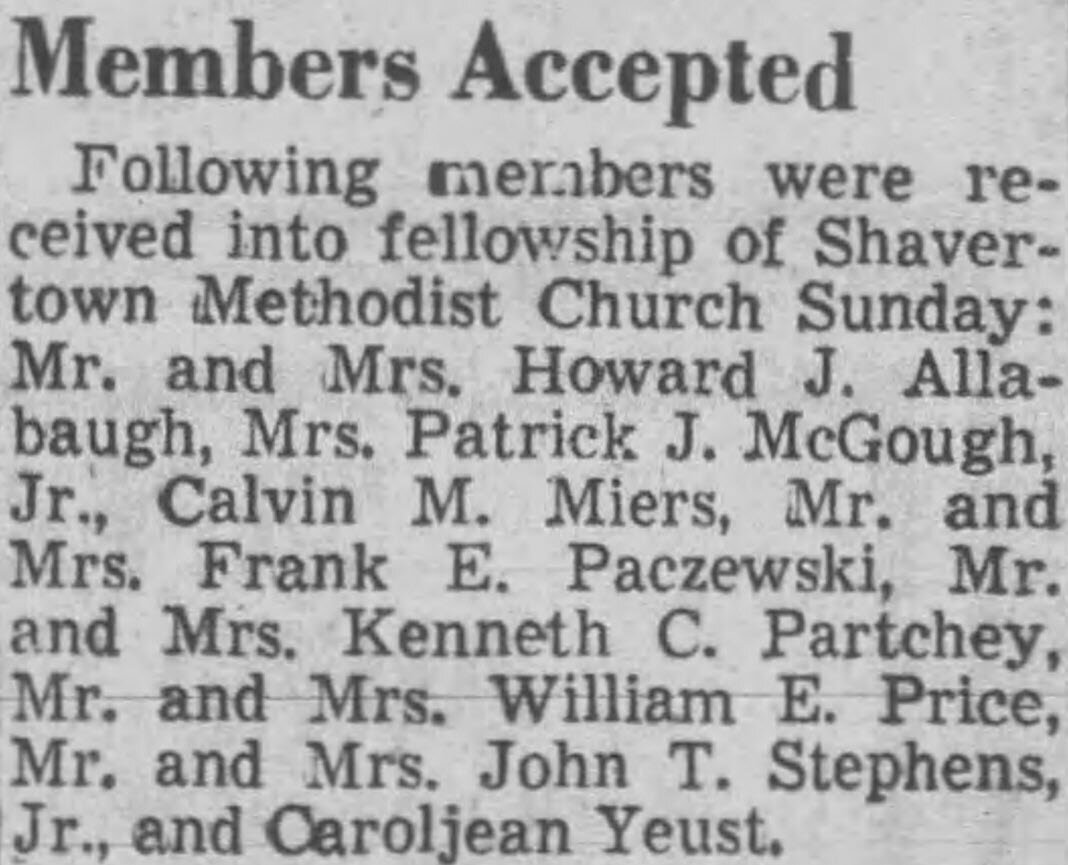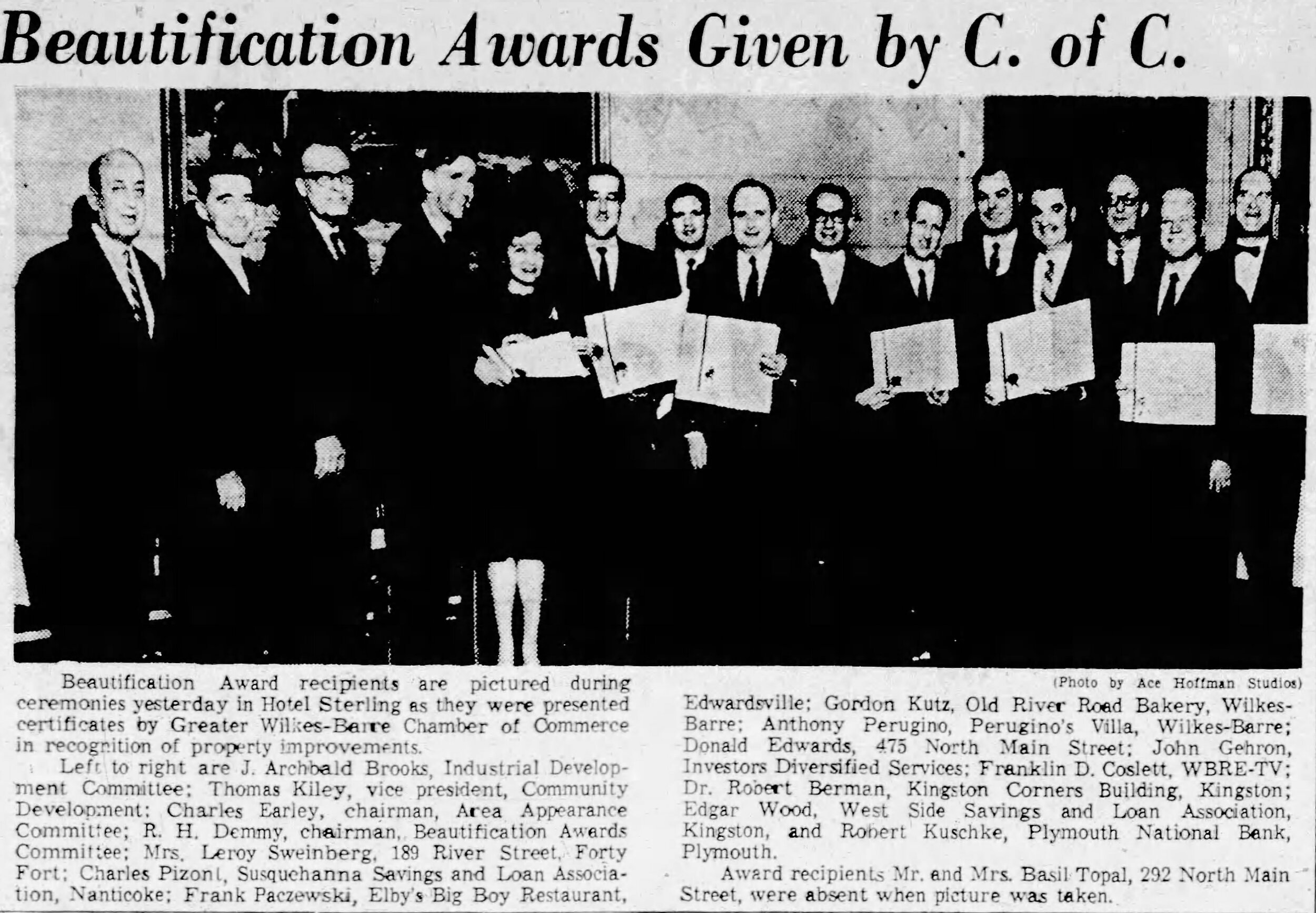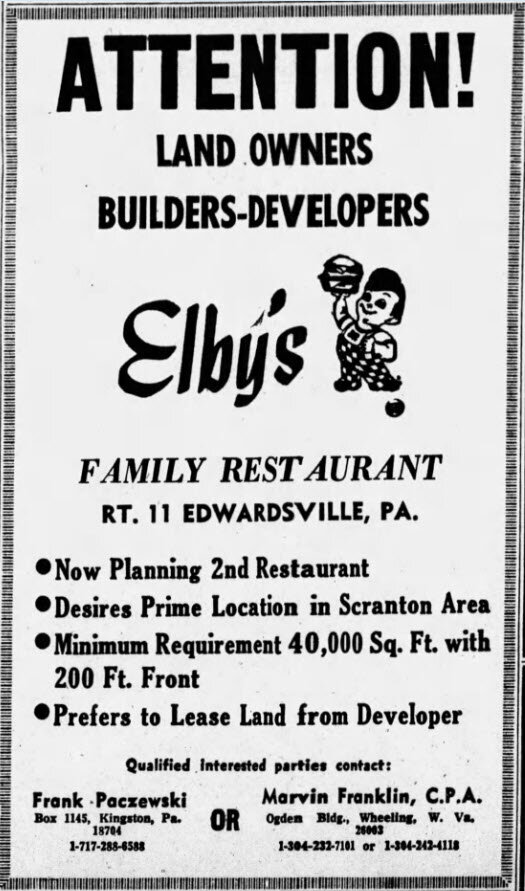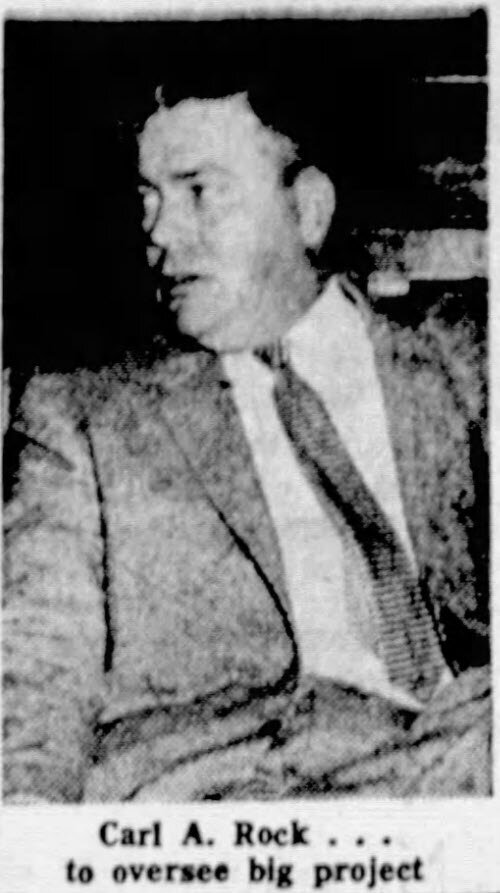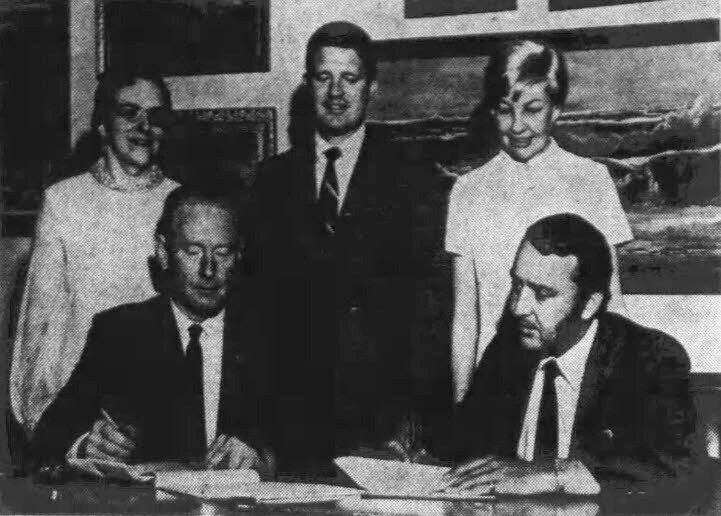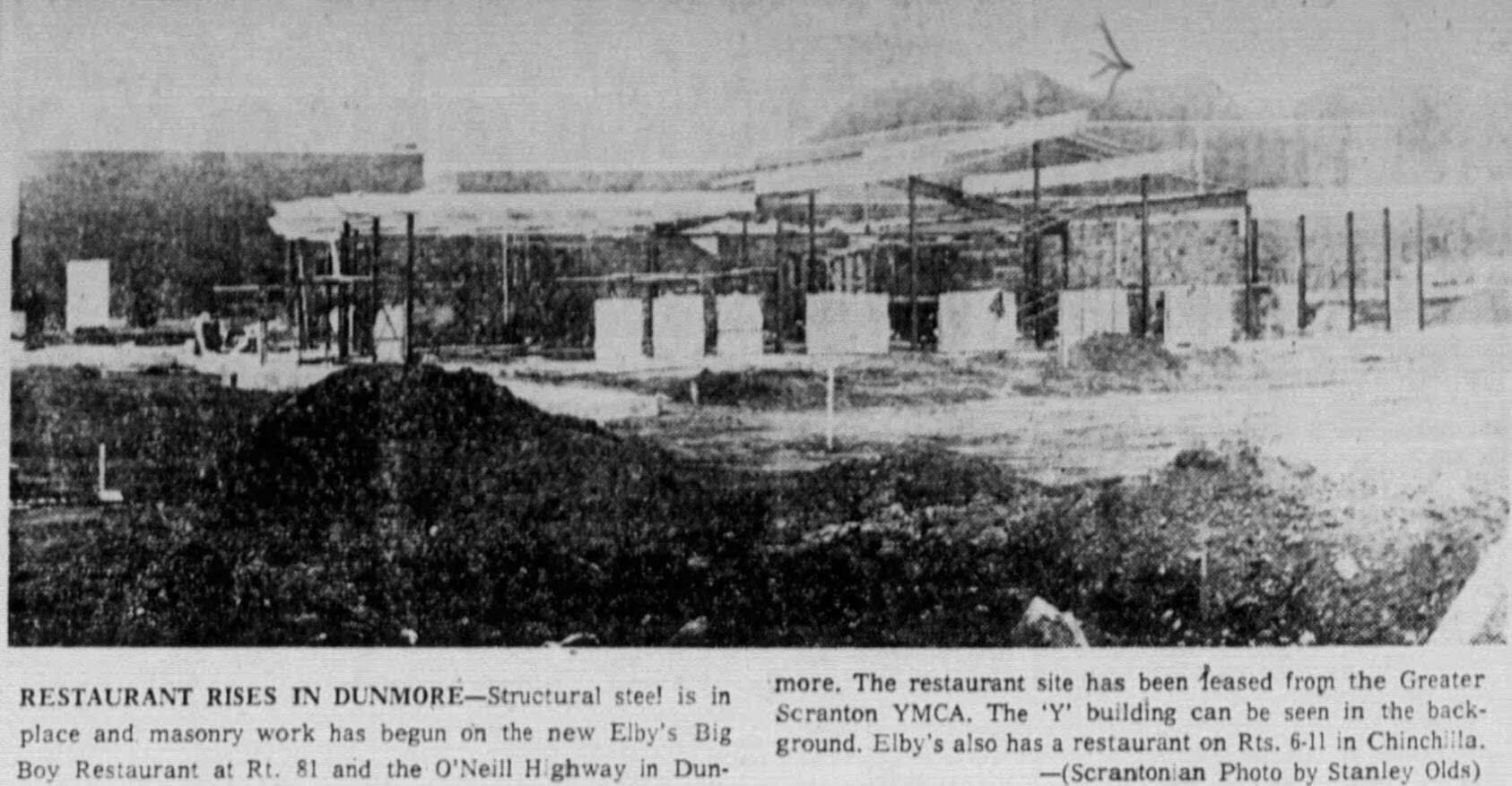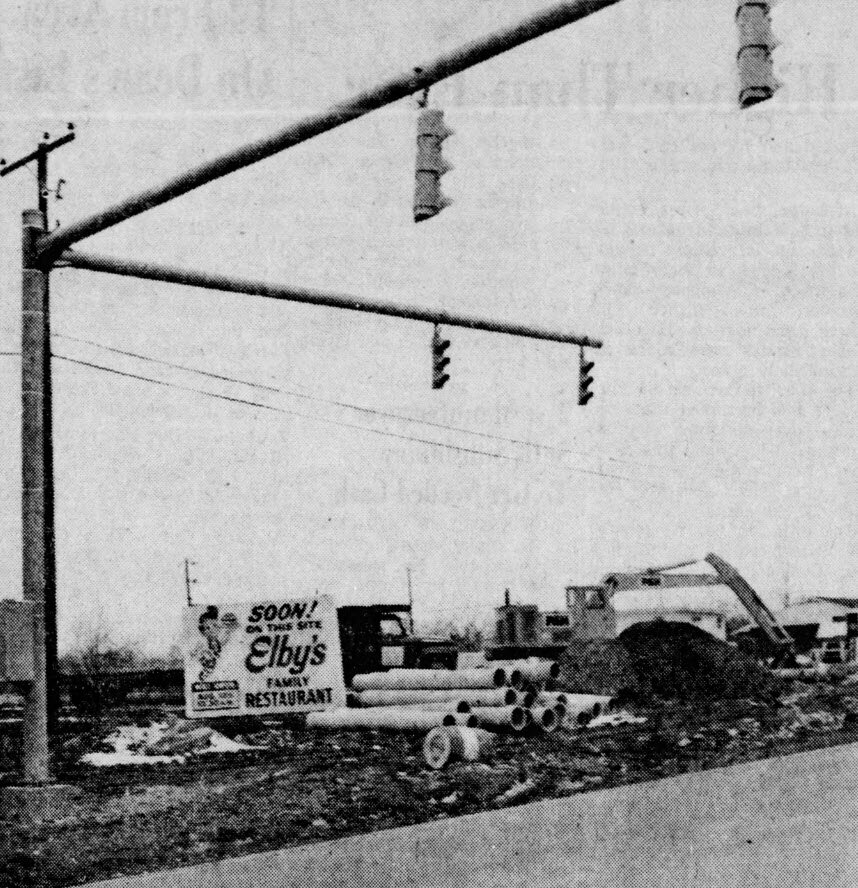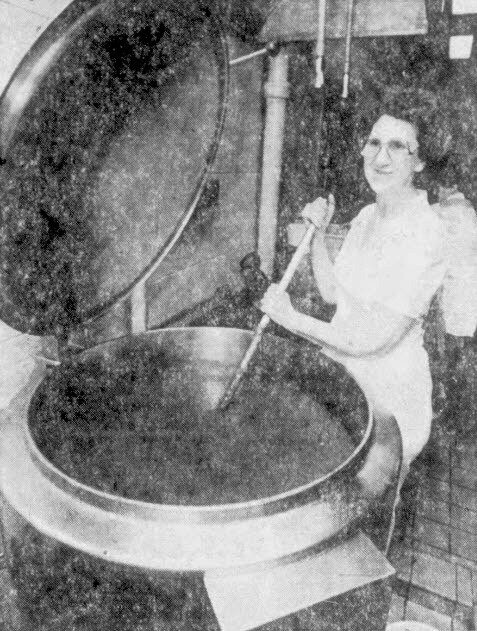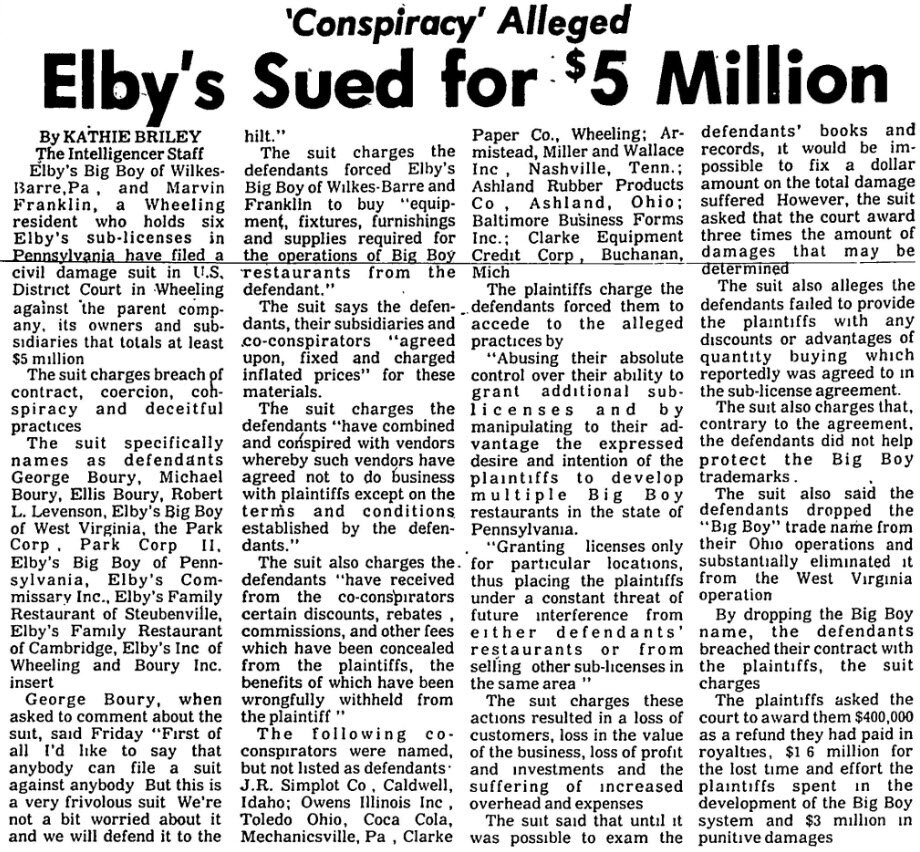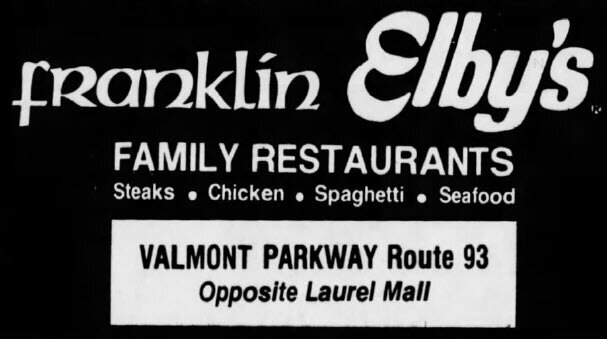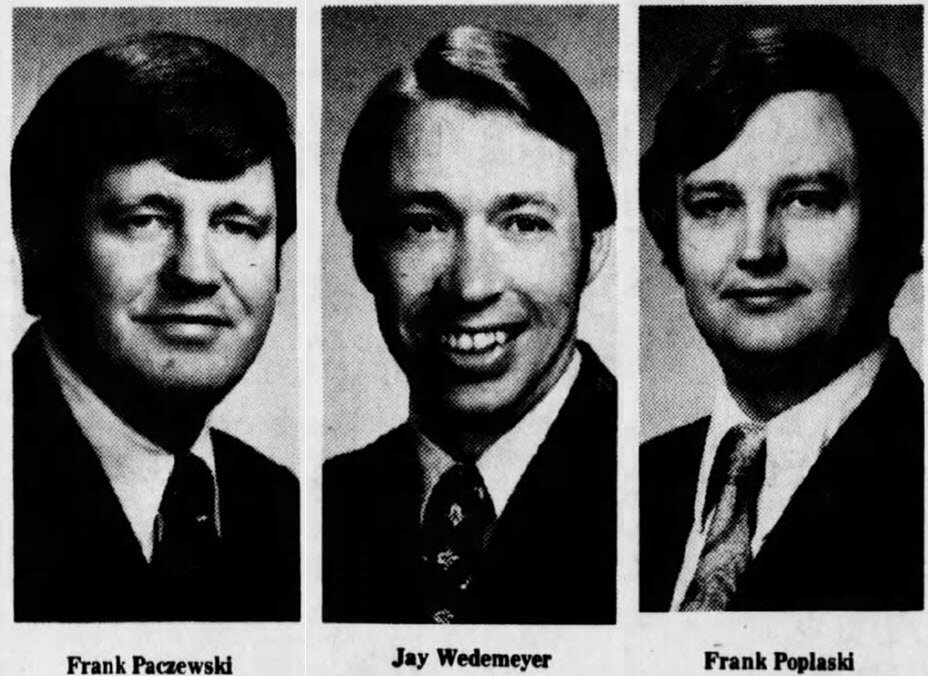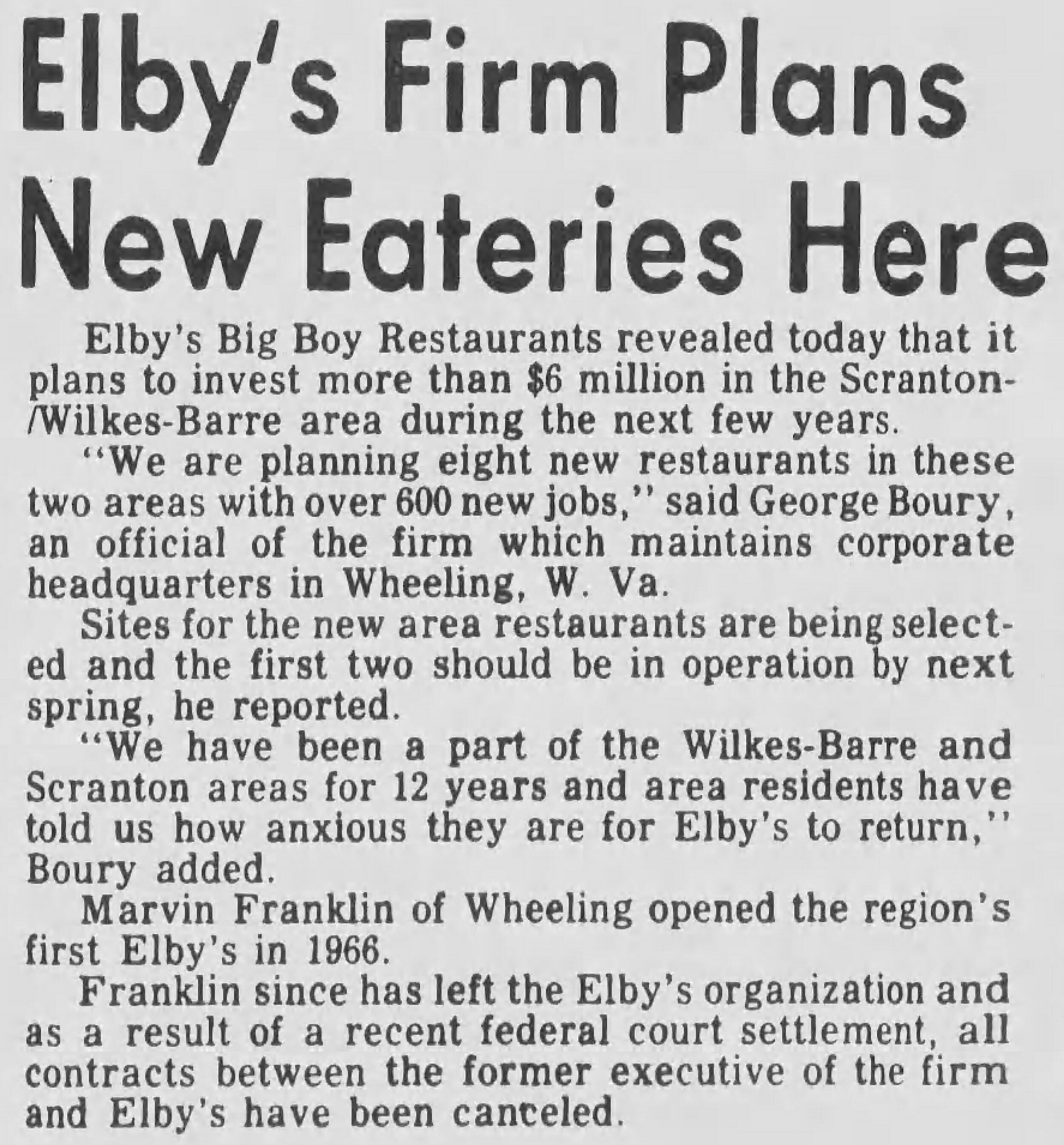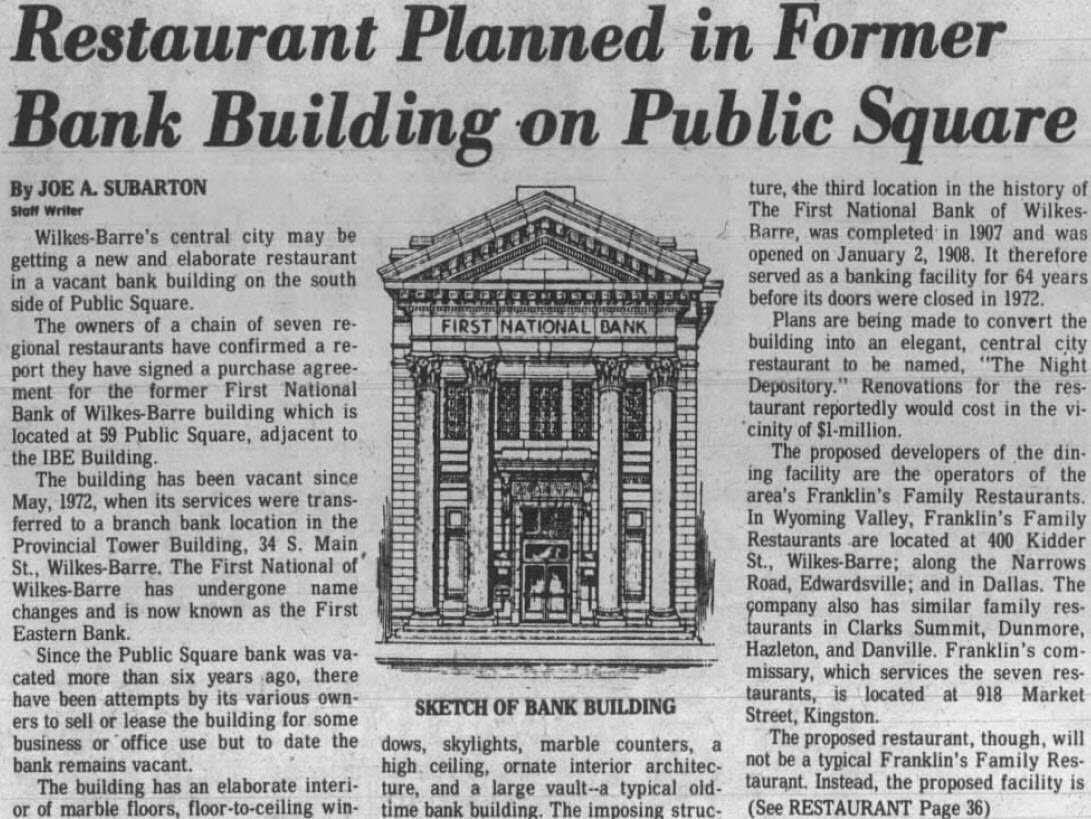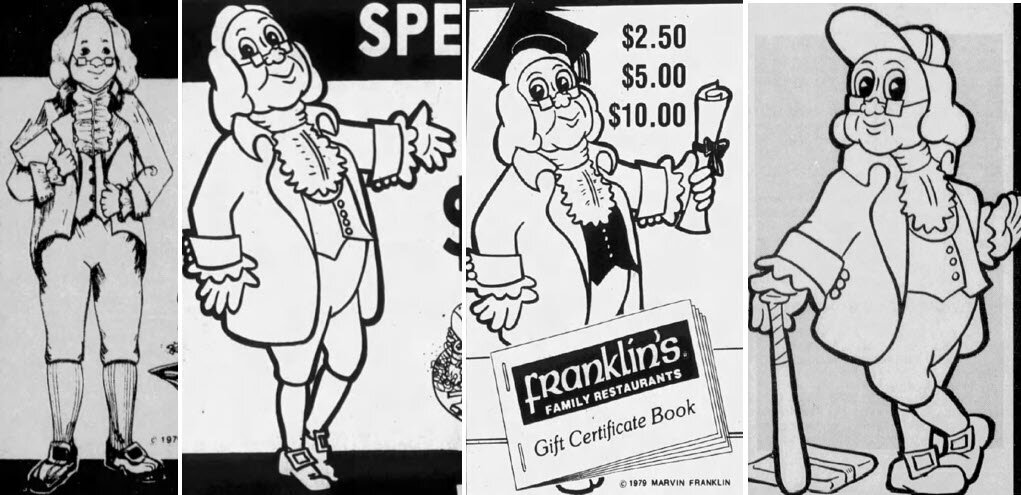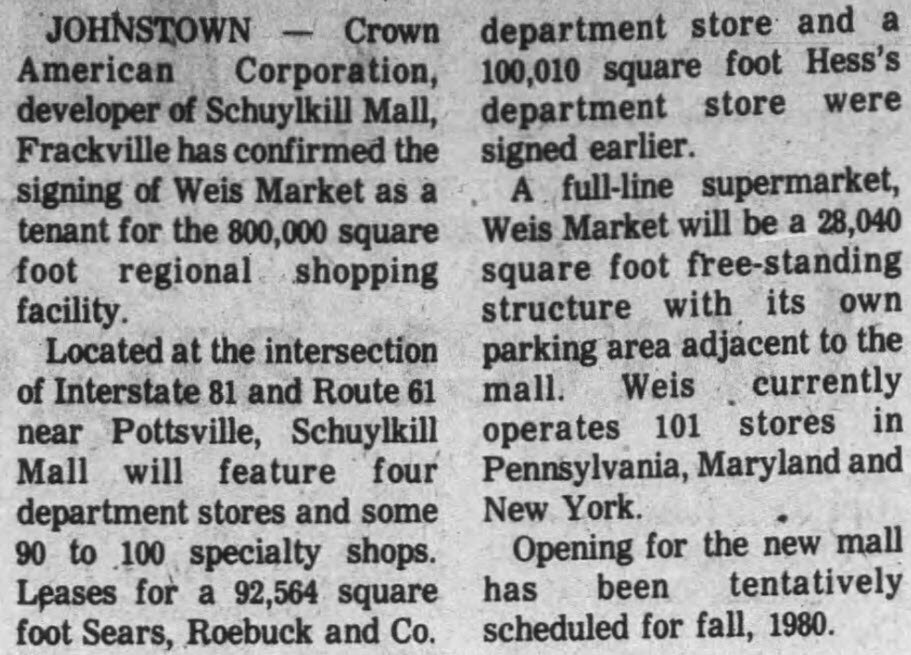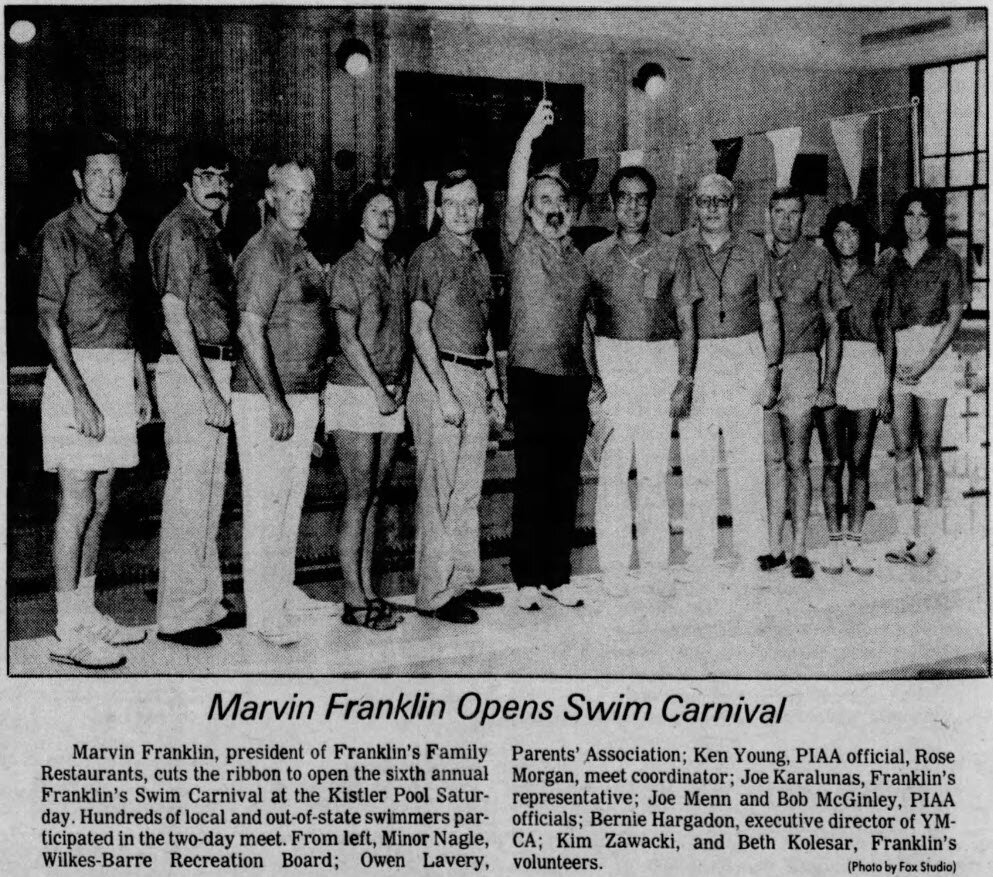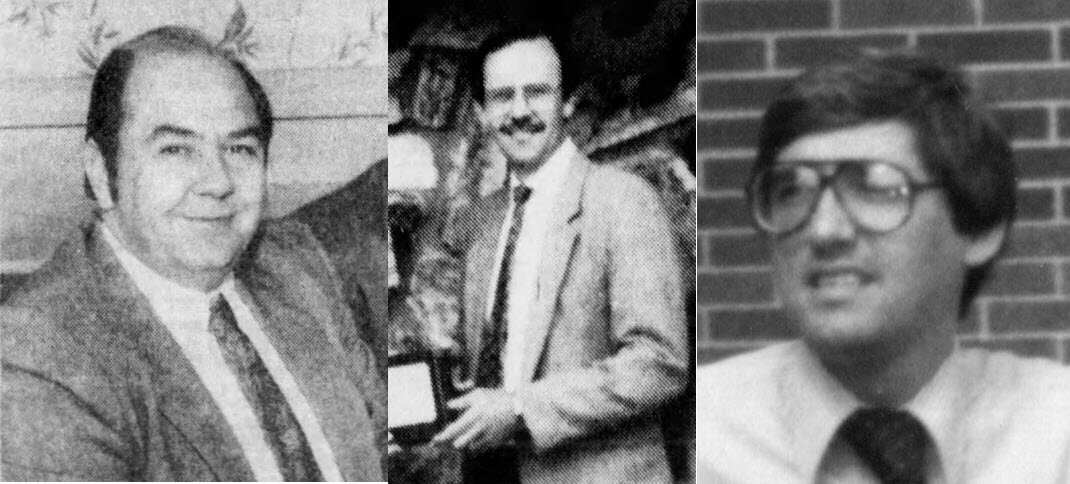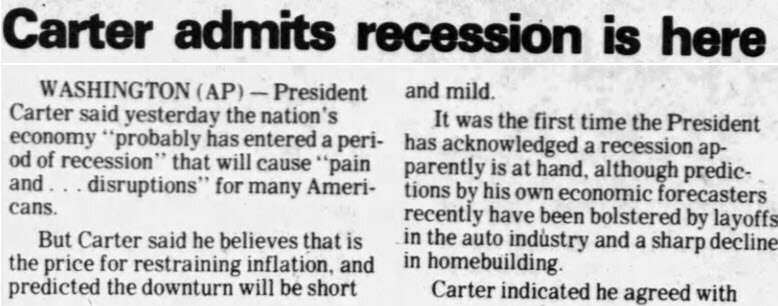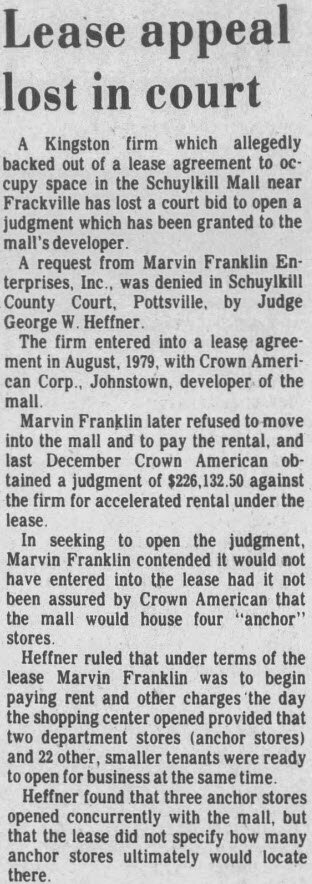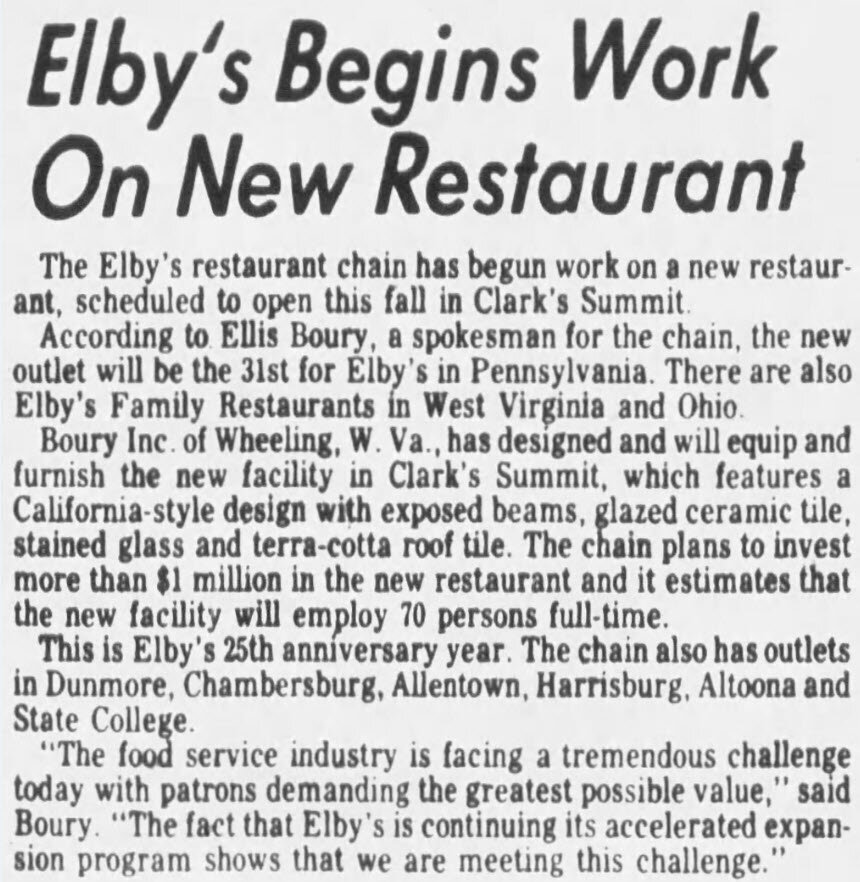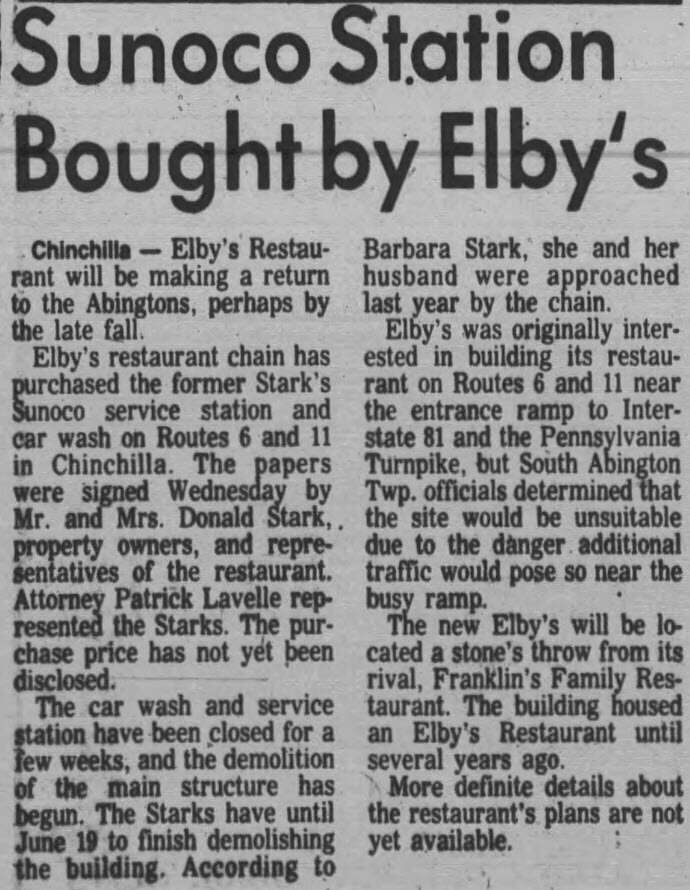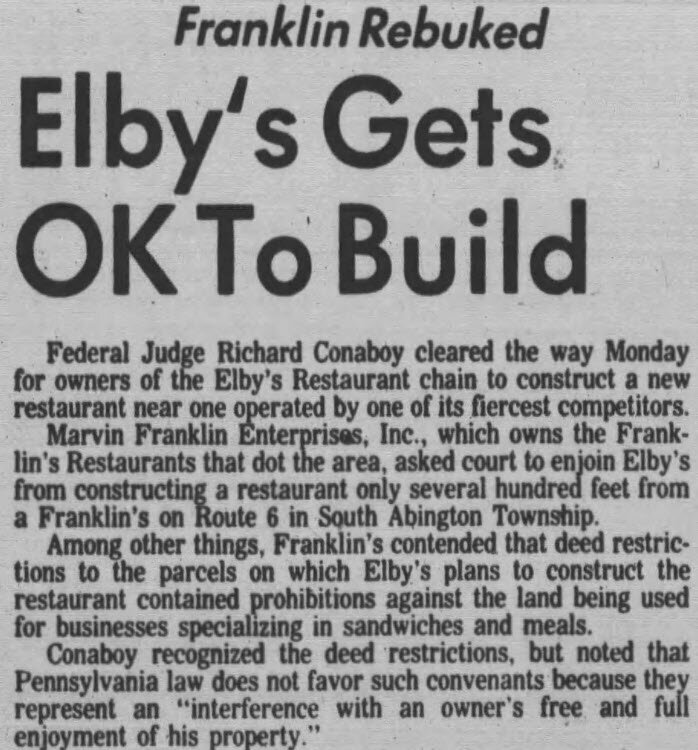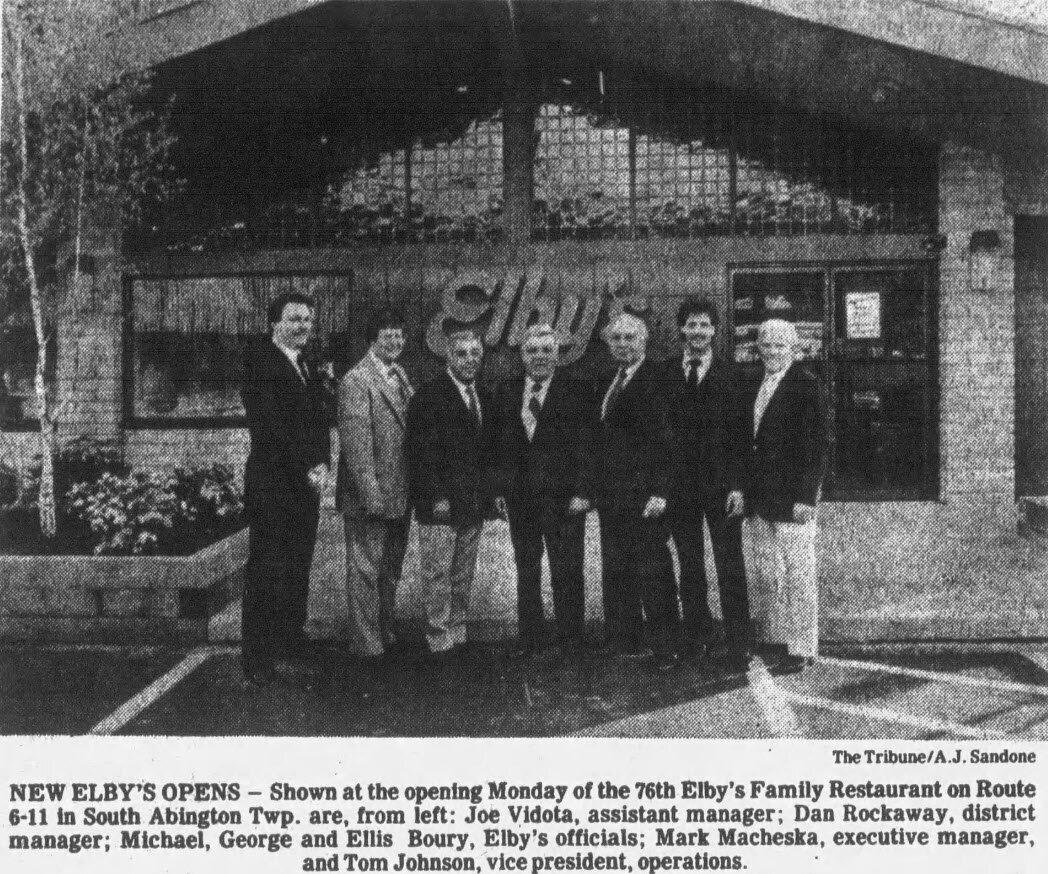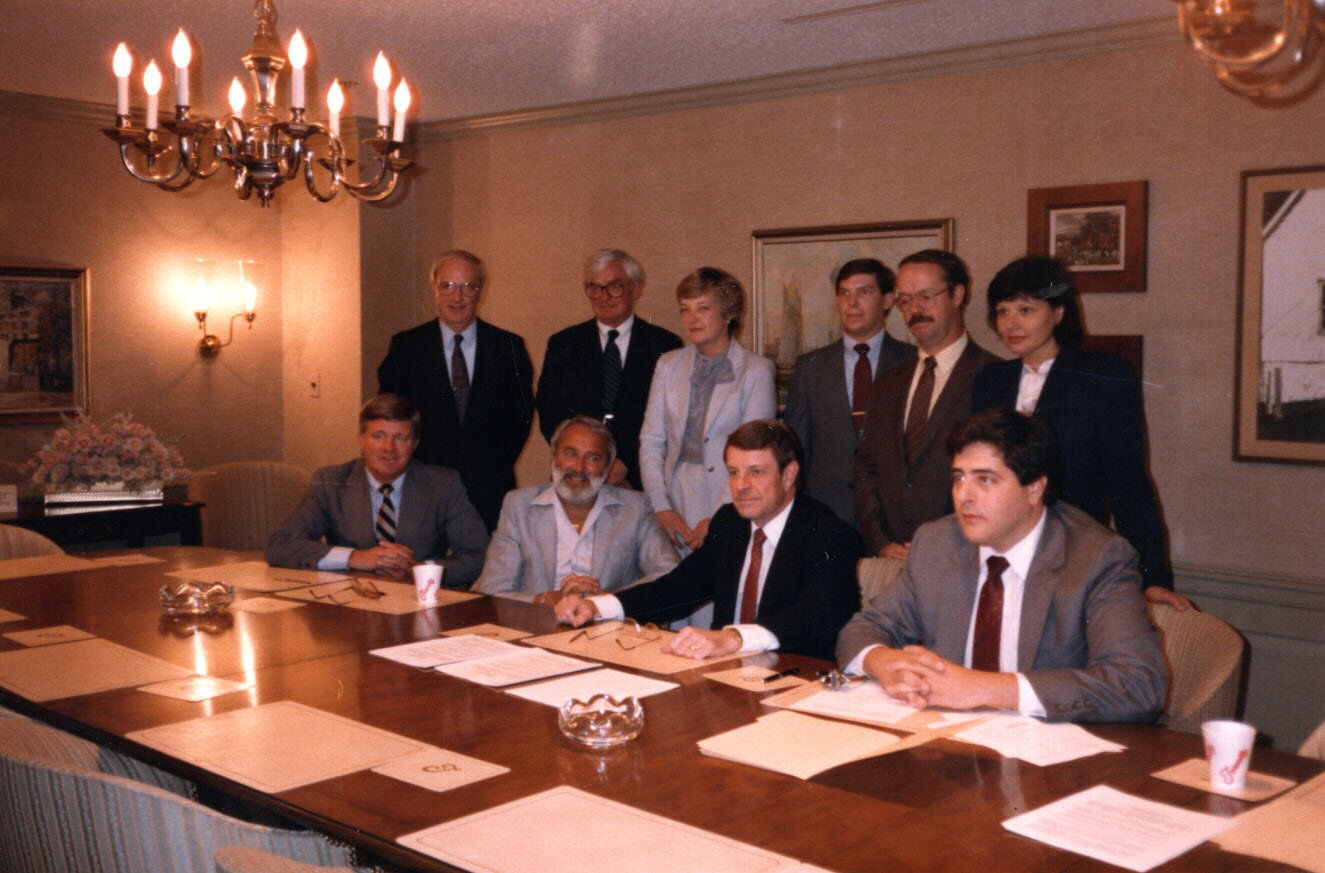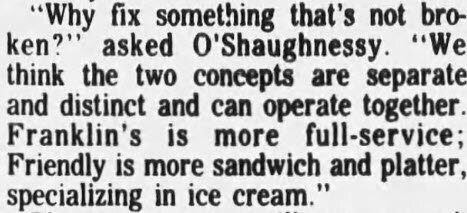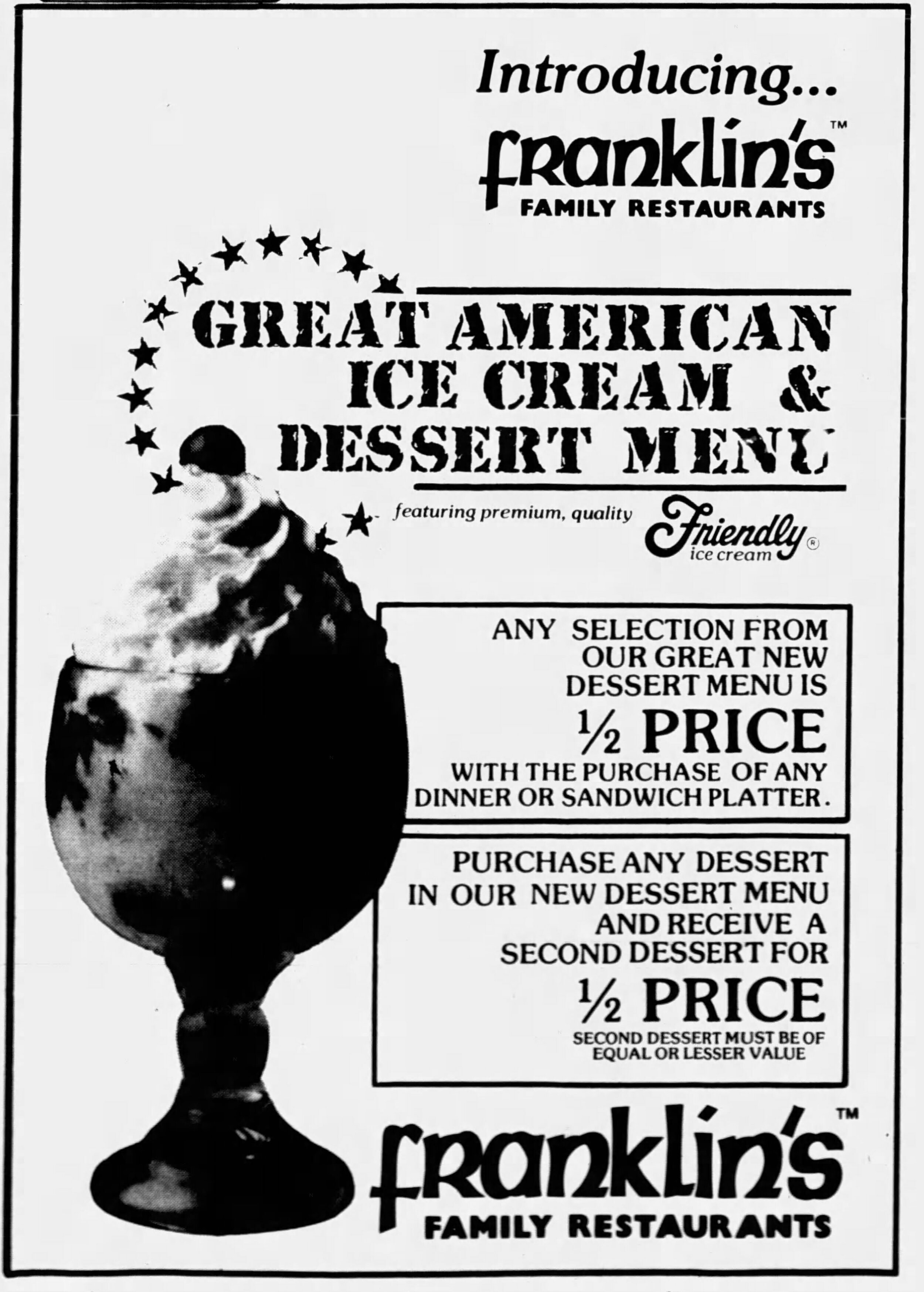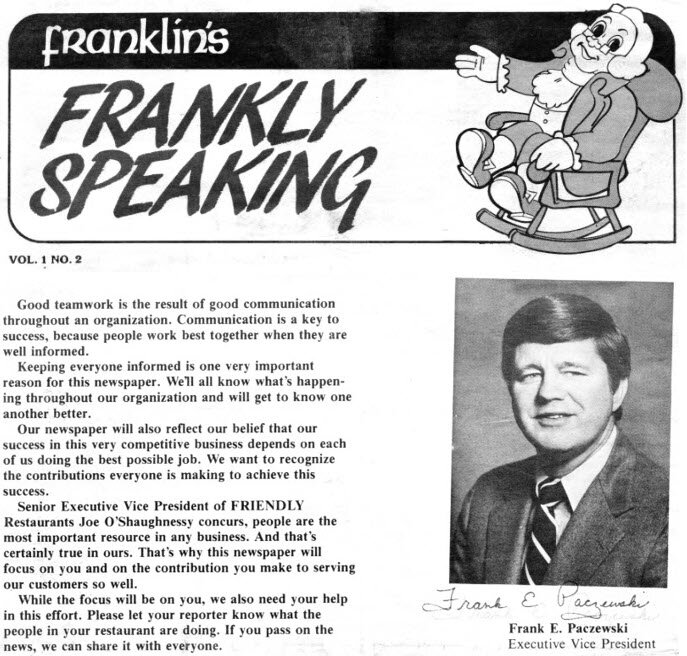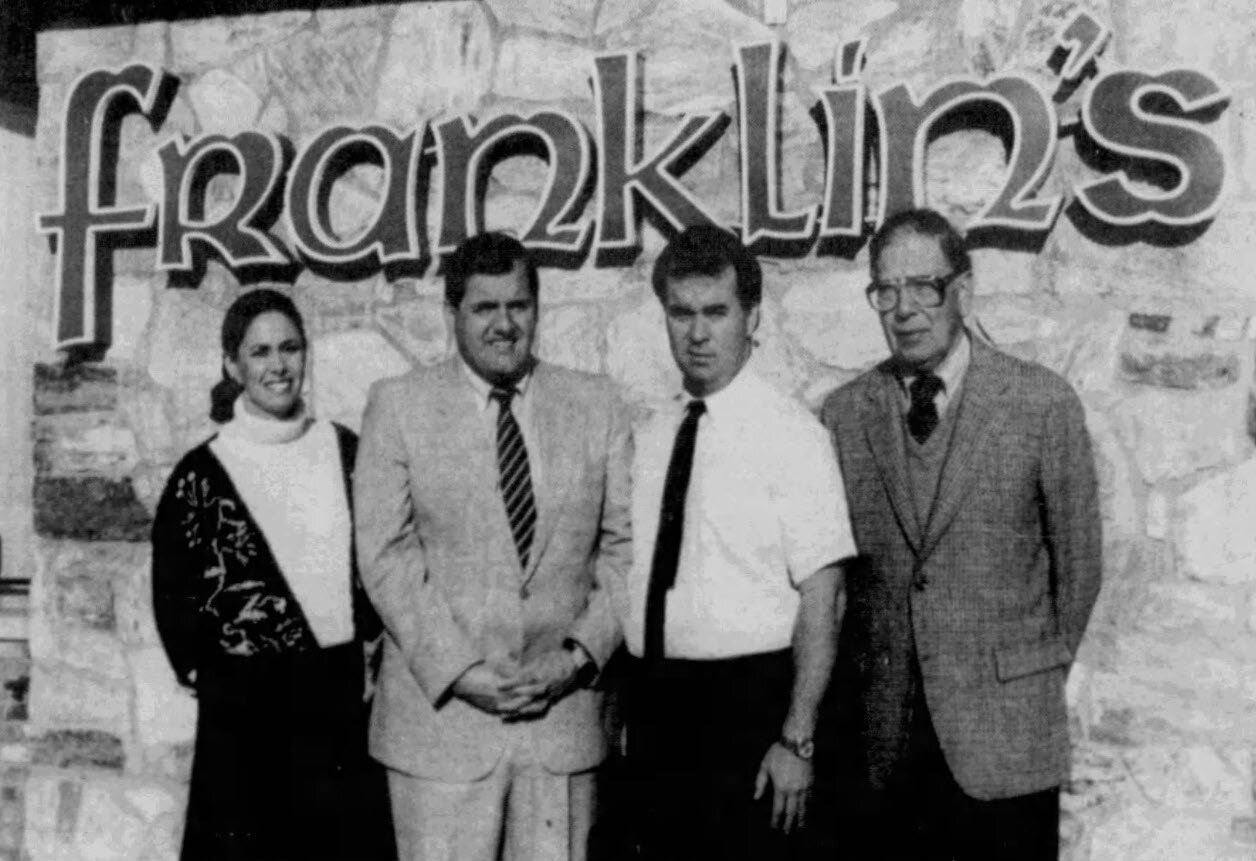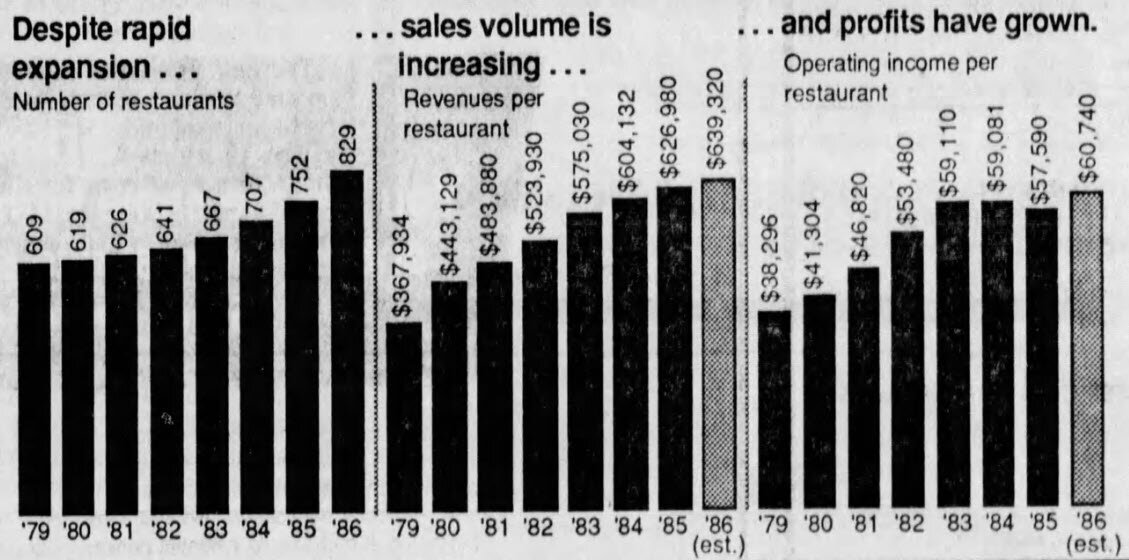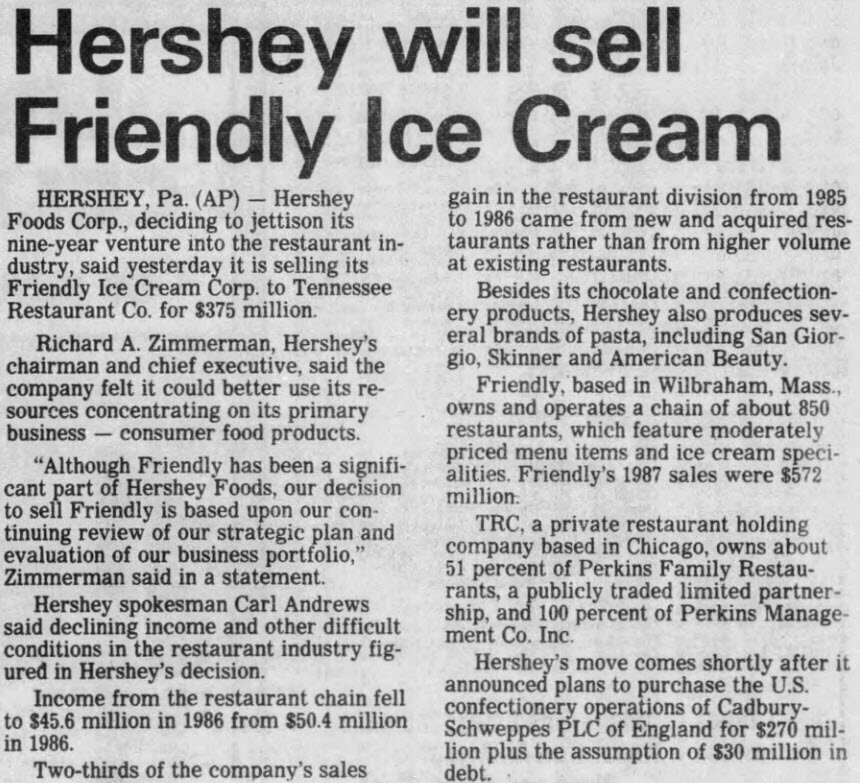The Franklin’s Family Restaurant Story by Drew Techner
I worked for Franklin’s Family Restaurant from 1982 to 1988 and held all positions including busboy, dishwasher, short-order cook, janitor, breader, waiter and host. I was assistant manager at both the Cottman Avenue and Montgomeryville units.
Marvin Franklin 1943 Triadelphia high school yearbook
Marvin Franklin founded the Franklin’s Family Restaurant chain in Northeast Pennsylvania. In his early years, Marvin attended Triadelphia High School in Wheeling, West Virginia. His classmates described him as “suave.” He was the president of the model airplane club. Their motto was “when bigger and better planes are made we’ll make them.” He later became a private pilot like his older brother Sylvan.
Three Wheeling Intelligencer newspaper articles chronicling Harry Franklin’s bookie career; March 14, 1934; August 14, 1948 and March 26, 1949.
His father Harry operated a pool room on Lincoln Avenue, a cigar store and, in the 1950s, the Franklin Bar & Grill restaurant at 1039 Main Street in Wheeling with a partner, Paul Briggs. In 1952, Briggs, 43, was found dead at the bottom of his cellar steps with a broken neck and severed spinal cord. Harry Franklin was best known to police and grand juries as a horse bookie that was arrested numerous times. Briggs was also a known gambler.
July 10, 1956 Wheeling Intelligencer
One of Marvin’s classmates was Ellis Boury.
In 1956, brothers Michael Boury, George Boury and Ellis Boury opened the first Elby’s restaurant on route 40 in Wheeling, West Virginia. Ten years later, Boury Enterprises expanded operations into Ohio, West Virginia and western Pennsylvania. The Bourys began Elby’s with the formula to "offer good quality food, clean wholesome surroundings, fast friendly service and reasonable prices.”
In early 1964, Marvin Franklin, Certified Public Accountant, was interested in opening a restaurant franchise in the Greater Wilkes-Barre/Scranton area. Late that same year, after months of searching for a land site, Franklin met well-known Luzerne county contractor W. J. Connolly who owned an attractive parcel near two well-established shopping centers in Edwardsville, two miles west of Wilkes-Barre. Connolly was active in Democratic party politics. In 1964, Connolly was justice of the peace in Forty Fort and in 1956 was a delegate to the Democratic National Convention in Chicago.
William J. Connolly contractor and political boss
An article in the 1982 Restaurant Yearbook Magazine of the Pennsylvania Restaurant Association noted the deal made between the two men, “under the terms which both agreed to, conveyance of the land would be held for a mutually acceptable, option-binding period. To solidify his part of the bargain, Franklin produced a $20 bill, as good faith deposit.” Marvin Franklin’s fortune changed after he met the politician.
The Franklin Elby, Inc. was created on September 1, 1965 by Joseph Franklin, with the State approving its corporate charter, and was “authorized to capitalize at $10,000 to engage in the business of ‘building, operating, managing and conducting for profit a Big Boy retail restaurant business, dealing with all members of the general public, in one or more locations in the State of Pennsylvania, and under the auspices of and with all privileges insuring from a franchise granted by Elby’s Big Boy of Pa.”
Joseph L. Franklin was Marvin’s older brother and gave the “Barre Motel” at 497 Kidder St., Wilkes-Barre as his address for the state filing. Incorporators were Marvin Franklin, his first wife Ruth and Marvin’s attorney. Officers were Marvin Franklin as president and his close friend Frank E. Paczewski as vice-president and general manager of operations.
After beginnings on the 1956 all-State High School baseball team, Paczewski attended West Virginia University (WVU) on an athletic scholarship. He was on the university’s baseball team from 1958 to 1961 with a .340 average. He received both a B.S. and, in 1962, an M.B.A. from that school.
Frank Paczewski The Charlotte (North Carolina) Observer June 2, 1961
Also on September 1, 1965, Marvin and Joseph Franklin created the “M & J Realty, Inc.” to handle all real estate matters related to buying a site and building the first restaurant. The incorporators were the same: Marvin, his first wife, and his attorney. The charter was a separate one from the Big Boy franchise charter.
On December 9, 1965, the Luzerne County Planning Commission approved a request to rezone an area in Edwardsville. Franklin Elby’s Inc. was “interested in erecting a drive-in restaurant. Firm has asked the district to be rezoned from light manufacturing to community business. Site is adjacent to Atlantic Refining Company.”
On January 5, 1966, the Commission held a public hearing at the Luzerne County courthouse with no opposition to the zoning change.
January 6, 1966 Wilkes-Barre Times Leader
On January 22, 1966, the Wilkes-Barre Times Leader reported that the M & J Realty, Inc. purchased the “State Highway No. 4, Edwardsville” site from William Connolly and his wife for $30,000.
Joseph Franklin was gone within a year of the restaurant’s first year of operation. Marvin Franklin’s second wife Charlotte would later say that her husband was an accountant who got into the restaurant business reluctantly when he partnered with a relative who ended up backing out.
In September 1966, as the restaurant neared its opening, the Luzerne County Board of Adjustment reviewed a zoning variance request for a sign. They approved it the following month. Meanwhile, Elby’s was hiring.
September 13, 1966 Wilkes-Barre Times Leader September 16, 1966 Wilkes-Barre Times Leader
On September 27, 1966, Franklin opened his first unit in Edwardsville with Frank Paczewski as manager.
March 21, 1967 Wilkes-Barre Times Leader
If Franklin waited it could have been a lost opportunity. William Connolly died the last day of 1966 after seven weeks of hospitalization.
“Marvin Franklin was an absentee owner,” Paczewski told me. Frank and I recently spent hours over a salad lunch at Miller’s Ale House in Wilkes-Barre. He still lives in Dallas where many of the employees came from. Our waiter was Angelo. More than three decades later, and I watched as he instinctively took an interest in Angelo, asked about his family and appreciated his service. It was clear to me that Paczewski built his success by investing in both business and people.
Paczewski said that he met Franklin at an American Legion baseball game in 1956 in Wheeling. Franklin approached him one day and said, “how come a good-looking guy like you has crooked teeth?” He initially didn’t know how to take that but the two soon developed a close friendship. Marvin arranged for Paczewski to see a dentist.
During that same summer, Frank shared a letter received from West Virginia University offering him a baseball scholarship. Marvin was very happy for Frank and commented that he was very excited for him, and expected that he would accept the offer. Frank explained that he was not prepared for college and had planned to join the army. That was unacceptable to Marvin, and he subsequently persuaded Frank to accept the scholarship. Two weeks later, Frank enrolled at West Virginia University for which Paczewski said he was “eternally grateful.” Frank’s career path was suddenly changed.
One day, Franklin told him that he wanted to go into business with him opening up a restaurant in northeast Pennsylvania. As Paczewski was leaving to meet Franklin, Paczewski’s wife Marsha asked him what he was going to tell him. He said he was not going to do it. After he returned, Paczewski told his wife they were moving to Wilkes-Barre. The couple purchased a home in Dallas township just before Edwardsville opened.
Paczewski said he was surprised that his wife didn’t leave him the first several years. He explained that he worked very long hours and did whatever had to be done. If the restaurant had to be cleaned at closing time and there was no janitor, he would “do it myself and mop every inch of the restaurant.” Meanwhile, Franklin’s new restaurant didn’t see any profit until after 18 consecutive months of losses.
1982 Restaurant Yearbook Magazine of the Pennsylvania Restaurant Association
Despite the long hours and expenses, Frank and Marsha Paczewski became part of the community. Six months after Edwardsville’s opening, the couple joined a local church.
Wilke-Barre Times Leader April 28, 1967
Paczewski, with his Polish surname and descent, was quickly accepted by his new neighbors and business leaders. They saw him as one of their own. Luzerne county experienced a large Polish settlement in the late nineteenth century and had vibrant Polonia heritage and culture. While Frank and Marsha Paczewski joined the community, the community took notice of their restaurant. In December 1967, the Greater Wilkes-Barre Chamber of Commerce honored Paczewski for the restaurant’s improving beautification, “attention given by the owners to the inclusion of plantings in traffic dividers.”
Wilkes-Barre Times Leader December 20, 1967
Paczewski’s commitment to building local ties continued. In March 1968, Paczewski served as general chairman of his church Couple’s Club’s annual roast beef dinner and on September 27, 1968, directors of the Greater Wilkes-Barre Chamber of Commerce approved his membership.
Also in 1968, Paczewski finished service in the army reserve. He joined in 1962 after graduation from WVU.
The red ink turned black in the spring of 1969. Franklin and Paczewski began looking for Unit #2.
The Scrantonian June 15, 1969
In August 1969, Carl Rock, owner of Adrian’s Restaurant on Route 611 in South Abington Township agreed to a 15-year lease to “Elby Big Boy Restaurant.” Rock, who was engaged in the coal and trucking businesses, had just landed a job as executive director of the Lackawanna River Basin Sewer Authority at $12,000 annual salary. Rock was later appointed to highway superintendent of the Pennsylvania Department of Highways for Lackawanna County. During the three years leading up to Adrian’s closure, Rock’s headaches with the restaurant included several burglaries, fight disturbances and two recent employee fainting spells. Franklin invested $100,000 renovations in the property that would become his Clarks Summit, or Chinchilla, unit.
On December 9, 1969, Unit # 2 opened in Clarks Summit with Jay Wedemeyer as manager.
Marvin Franklin immediately began searching to locate a property for his third restaurant. In January 1970, William Heck, Sr. advertised the sale of his Imperial Motor Inn and restaurant at 400 Kidder Street. Heck, a developer, built and owned the complex in 1958 and it was originally called the Carousel Motel and Restaurant. Previously, the William Heck Construction Company built the Army Reserve Building near the Veterans Hospital , and a number of other Wyoming Valley structures. In February 1969, he renamed it the Imperial and for six months the restaurant featured Chef Fred Lew serving quality Chinese dishes.
Principals shows at lease signing were, seated, left to right, William Heck and Marvin Franklin; standing: Mrs. Jane Heck, Frank Paczewski, Mrs. Ruth Franklin. June 27, 1970 Wilkes-Barre Times Leader
Franklin stated that he would remodel the restaurant to be a 160-seat sit-down type family restaurant; and would offer a carry-out service. On November 10, 1970, Unit # 3 on Kidder Street in Wilkes-Barre opened with William Fahey as manager.
Unit #3 Kidder Street opening. Wilkes-Barre Times-Leader November 16, 1970
In January 1971, Franklin’s established a commissary in the basement of the Kidder Street unit. This allowed the company to purchase food supplies in volume and have a central distribution system.
Unit #4, the Dallas unit, was the former Suburban Restaurant located “at the Y” (routes 309 and 415) on Memorial Highway. In December 1966, Robert Schalm purchased the restaurant from John F. Connell and wife. At that time, he also purchased from them the Kingston House restaurant, the Twin Lakes picnic grounds in Kingston, and their Columbia Catering business.
In December 1968, Schalm sold the Suburban to Arthur E. and Lois McLaughlin for $100,000 but the couple defaulted on the monthly installments per sales agreement. Schalm sued the couple in court for the unpaid $75,000 installments but the First National Bank of Eastern Pennsylvania acquired the restaurant and the McLaughlins declared bankruptcy. The McLaughlins listed assets of $99,395, including stock of $75,000, and debts of $130,038.
In October 1971, Paczewski negotiated the purchase of the Suburban Restaurant from the bank. Dallas opened in May 1972 with Richard Burkhardt, manager.
October 11, 1971 Wilkes-Barre Times Leader
The Dallas unit was open a month before Hurricane Agnes. Despite flooding in the area, the Dallas unit was not affected.
Hurricane Agnes Flood June 22, 1972 Wilkes-Barre Times Leader
In January 1974, Robert Schalm, as president of the Automatic Cigarette Service Company, Inc., sold the former Columbia Catering property at 918 W. Market Street Marvin Franklin for $75,000. This was the same amount of money Schalm earlier lost in his sale of the Suburban Restaurant to the McLaughlin couple. The Columbia Catering property was actually worth more with its generous square foot space, built-in refrigerator and truck bays. But this was the amount Schalm wanted.
Marvin Franklin continued to open new Elby’s franchised units throughout northeastern Pennsylvania.
In late 1972, Franklin located a site at a busy cloverleaf interchange of route 347 and Interstate 81. On Tuesday, September 11, 1973, neighbors screamed at the Dunmore Borough Council in opposition of the restaurant’s building permit due to their concerns of safety because it was at a busy location.
Scranton Tribune September 12, 1973
However, both Councilman Louis Beardell and Borough Solicitor Durkin said the matter was beyond the stage of public meetings. The matter they said was over a year old and Tuesday was the first that opposition was voiced to the Elby’s construction. Dunmore unit #5 opened March 17, 1974 with Bob Dolbear, Jr. as manager.
The Scrantonian November 25, 1973
In late February 1974, excavation work began at the site for yet another Elby’s restaurant for Marvin Franklin. A year earlier, in March 1973, Marvin Franklin purchased the lot in Hazle Township, Luzerne county for $73,125. The actual site was on route 93 across from the Laurel Mall.
Standard Speaker March 1, 1974
Hazleton unit #6 opened on August 13, 1974, with Bob Dolbear as manager. Newspapers heralded the opening with details of its hours, construction and upcoming management team; Jay Wedemeyer was now Paczewski’s assistant, and Dolbear would be assisted at the new unit by Emil Polchin and George Adams.
However, only two months later, the Pennsylvania Department of Environmental Resources cited the restaurant, the Hazle Township Board of Supervisors and The Greater Hazleton Joint Sewer Authority for Elby’s discharge of sewage without a permit.
Standard Speaker October 22, 1974
The matter remained open until January 1975 when the township took responsibility and paid the fines, including $100 on behalf of Elby’s.
In 1975, Franklin’s commissary was moved from the basement of the Kidder Street unit to the former Columbia Catering 10,000 square-foot facility at 918 W. Market St. in Kingston, Pa. This property also included the company’s executive offices.
Eleanor Basta stirs 55 gallons of spaghetti sauce
The larger facility allowed the commissary to prepare food to feed 100,000 diners a week. “We’d make as high as 225 to 250 gallons of soup a day,” kitchen manager Eleanor Basta said in a 1984 interview. Soup was cooked in 60 and 40 gallon kettles. They would also daily prepare 50 gallons spaghetti sauce and 24 gallons chili. 128 gallons strawberry pie glaze was made each week.
It was about this time that Boury, Inc. brought a stop to new franchises, according to a later interview with the Morning Call of Allentown. Ellis Boury explained that franchises at first were thought to be “vehicles of expansion” but the brothers learned the company legally had little control in the way franchises were run or their quality. “We could walk into a franchise and find an off-brand bottle of ketchup on the table,” said George Boury. “We’d like to say [to the franchisee]. "‘You’re supposed to use Heinz, the way you were taught,’ but he could sue us.”
However, Boury, Inc. was expanding during this time, just not in northeast Pennsylvania. Throughout 1976 and early 1978, they added Pennsylvania units in York, Harrisburg, Williamsport, Greensburg, and Chambersburg. They also continued expanding in Ohio with a Columbus unit. And the Bourys did bring on a new franchisee, Restaurant Management Inc., for their Williamsport unit. However, this franchisee was George Boury, president; Mary Ann Boury, vice-president; and Michael’s son, Michael Boury, III, agent.
What the Boury brothers were referring to in their 1983 interview was their problem with Franklin’s. The underlying problem was personality conflict that culminated in lawsuits as mentioned later in this article. Both Marvin Franklin and the Bourys were from Wheeling and knew each other.
The Boury and Franklin families came from mostly different backgrounds. The Bourys were Christian Syrian Arab descent and spoke Arabic in their home while growing up. Franklin was Jewish, president of Temple Shalom and a strong supporter of Hadassah and Temple Shalom. The Boury brothers were all older than Marvin; George eight years older, Michael five years older and Ellis one year older. The Bourys embarked on their restaurant empire after World War II as continuation of their father’s restaurant supply business. While Franklin’s father ran a restaurant at one time, Marvin didn’t enter the restaurant business until two decades later. For whatever reason, Franklin felt the Bourys looked down on him. Tensions had been developing for some time.
One early trigger was the fact that Franklin did not use the Bourys for designing and building his units. Boury Inc. showcased their “Contract Design Center” department, with Herbert O. Burton, head; for the design of their Elby’s restaurants. The Bourys also supplied the materials for unit construction, such as the copper range hood above the kitchen window. Paczewski remembers the Bourys being upset that Marvin Franklin didn’t use their services after Unit #1 Edwardsville. Franklin used Rex Craft Associates for construction of the Clarks Summit and Dunmore units and Ira Berger & Son for the Hazleton unit.
Standard Speaker April 20, 1974
Paczewski explained that the franchises the Bourys granted to Franklin were specific to each restaurant and separate from each other. For example, the Kidder Street store was the “Elby’s Big Boy of Wilkes-Barre, Pa.” franchise. These were 10-year agreements. Just after the Kidder Street unit opened, with Franklin having two more units on the drawing board, the Bourys notified Franklin that they would not allow any further franchises. At the time, Paczewski smoothed things over and Franklin’s expansion continued. However, as the years passed, Franklin felt the Boury’s were engaging in unfair business practices.
The Intelligencer September 27, 1975 Wheeling, WV
On September 25, 1975, Marvin Franklin and the Kidder Street franchise filed suit against the Bourys for $5 million alleging breach of contract, coercion, conspiracy, and deceitful practices and forced Franklin to accede to the alleged practices by, “abusing their absolute control over their ability to grant additional sub-licenses and by manipulating to their advantage the expressed desire and the intention of the plaintiffs to develop multiple Big Boy restaurants in the state of Pennsylvania.”
The suit was filed near the end of the expiration of the first store’s franchise.
It could have been that the Bourys were simply doing to Marvin Franklin what Frisch’s were doing to them. The Ohio-based Frisch’s granted the Big Boy franchise in Pennsylvania (excluding Pittsburgh and Philadelphia) to the Bourys. In 1970, founder David Frisch died and his son-in-law Jack Maier took over Frisch’s, a public stock corporation. Newspapers from the period show that Maier’s focus was on stockholders and record stock and quarterly dividends. Perhaps this resulted in a restructure that put pressure on franchises. In 1971 Jack Maier refused Elby's a Big Boy franchise for their Cambridge Ohio store, ready to open. Elby's cancelled their Big Boy franchises in two other Ohio stores, and began building non-Big Boy Elby's in Ohio. This was the same time that the Boury’s initially refused additional franchises to Marvin Franklin.
The Weirton Daily Times November 23, 1970
Maier spent the next 16 years suing Elby's for trademark infringement.
Marvin Franklin changed his company to continue expansion. In late 1975, Franklin left “Elby’s Big Boy Restaurants” and began calling his chain “Franklin Elby’s,” and, in January 1976, he renamed them “Franklin's Family Restaurants.” The Franklin Elby, Inc. became Marvin Franklin Enterprises, Inc. but continued as a Wheeling, West Virginia-based firm.
December 22, 1975 Hazleton Standard-Speaker
January 26, 1976 Wilkes-Barre Times Leader
Paczewski remained hands-on as Franklin’s expanded. He would frequently jump in and help when visiting units. It was not uncommon to see him wiping down tables or cooking food. However, company attorney Robert Browning noticed that this was too much and after the opening of Hazleton, Browning told Paczewski to “stay out of the kitchen” and concentrate on his executive duties.
Franklin placed his three most loyal managers in corporate executive leadership positions: Frank E. Paczewski, executive vice-president; Jay R. Wedemeyer, vice-president of operations; and Frank E. Poplaski as district manager. Immediately prior, Wedemeyer was Paczewski’s assistant and Poplaski was the manager of the Edwardsville unit.
All had Wheeling connections. Paczewski was a Wheeling native and both Wedemeyer and Poplaski attended Wheeling College where Marvin Franklin was former chairman of the accounting department.
Jay Wedemeyer joined Franklin’s in 1968 and managed the Clarks Summit, Dallas and Dunmore units. He was executive manager of these units, commissary manager and Paczewski’s assistant. Wedemeyer married the former Barbara Dodson of Weston, Va. He left Franklin’s in 1984. Frank Poplaski joined Elby’s in May 1970 as a trainee and was promoted to assistant manager shortly thereafter. He became executive manager in May 1972 and in 1976 became as supervisor in charge of Scranton and Wilkes-Barre units.
Marvin Franklin continued running his restaurants with a menu and similar to Elby’s. The first unit that opened as Franklin’s was Unit #7 Danville on June 29, 1976.
Danville News April 15, 1976
Around this same time, George Boury, with his brothers as partners, filed a countersuit to Marvin Franklin’s anti-trust claims. A 1978 a court settlement resulted in cancellation of contracts between Elby’s and Marvin Franklin. Franklin was ordered to return all recipes, manuals, etc. to Elby’s. They were also ordered to substantially vary their food items from Elby’s and pay Elby’s a substantial sum of money. George Boury vindictively announced plans to build eight new restaurants in the area.
The Times Tribune August 28, 1978
This meant war and Franklin’s embarked on a “shot-gun approach” of expansion.
Marvin Franklin’s initial effort to expand never materialized. It was August 1978, and he may have acted impulsively because it was in the wake of the court settlement. Franklin purchased the First National Bank of Wilkes-Barre on the south side of Public Square at $225,000. It sat vacant since the Hurricane Agnes flood in 1972. Franklin’s planned to convert the property into an elegant restaurant called, “The Night Depository” with $1 million renovations. Franklin finalized the deal even though Paczewski warned him that he was still negotiating with another business for the restaurant’s parking.
Wilkes-Barre Times Leader August 17, 1978
Whether renovations or new construction, financing was needed. On March 14, 1979, Marvin Franklin, Inc. filed with the state to change the capital structure to increase the authorized capital from 10,000 shares of no par common stock to 100,000 shares.
From April to June 1979, the company introduced and developed their “Ben Franklin” mascot:
April 9, 1979 first appearance; May 14, 1979 different caricature; May 15, 1979 shorter with black vest; June 23, 1979 final version with larger glasses, removal of lines from shirt ruffle and rounded shoes. The mascot was simply known as “Ben” to restaurant employees.
The mascot was based on the familiar historical figure Benjamin Franklin. However, the name could have also been in honor of Marvin Franklin’s grandfather Benjamine Franklin, a scrap dealer that was emigrated from Poland in 1904, raised his family in Canton, Ohio and died in 1933 when Marvin was seven years old.
In August 1979, Franklin agreed to lease and build a restaurant in the Schuylkill Mall near Frackville. At the time, the developer scheduled to open the mall in the fall of 1980 with four department stores.
Danville News March 12, 1979
Meanwhile, in November 1979, the downtown Wilkes-Barre unit opened with Chuck Pashinski, manager; in February 1980, the Montgomery Mall unit opened and on May 13, 1980, the Cottman Avenue unit in Northeast Philadelphia opened with Paul Nye, manager.
Marc Cour was a manager trainee at the time. District manager Paul Kutney’s notes from Cour’s training said, “expansion - 13 units by the end of 1980.” The July 14, 1980 Scranton Tribune reported a Franklin’s under construction at the Schuylkill Mall , off I-81 at Frackville.
On July 29, 1980, Unit no. 11 opened at Eynon with Daniel Corbett, manager; and on October 20, 1980, the “Allentown” Unit no. 12 opened in Whitehall with Joseph Kester, manager.
Allentown unit grand opening
Over the years, Franklin's would become established as part of the community throughout northeastern Pennsylvania with sponsorships of events and organizations. On August 7, 1976 the first annual Swim Carnival in Wilkes-Barre was held with Paczewski and Wedemeyer as committee members. This event was similar to Boury’s Annual AAU swim meet event in Wheeling that began in 1973.
Citizens Voice July 27, 1981
In 1977, the Franklin’s / YMCA Greater Scranton half-marathon began with Frank Poplaski as Franklin’s primary representative. While Franklin’s 13.1-mile marathon may have imitated the “Elby’s Distance Race” 12.4-mile marathon that the Bourys started the same year in Wheeling, it was Franklin’s way of giving back to the YMCA that leased land for the Dunmore unit that stood adjacent to the Greater Scranton YMCA.
Citizens Voice September 24, 1981
But Franklin’s community support was only for the Wilkes-Barre - Scranton area where the top brass lived. Most of the employees were recruited from the Back Mountain area where Paczewski lived. Likewise, the in-house Franklin’s newspaper was distributed to all units but featured the full and part-time employees from northeastern Pennsylvania.
Franklin’s did not imitate Elby’s annual award recognition program for employees. Each years, Elby’s held an awards dinner-dance where the Bourys presented employees with 20, 15, 10, five and three year Awards.
Another well-known key Franklin’s employee was Betty Leandri. She was the original waitress trainer and assistant manager at the downtown Wilkes-Barre unit just before she left about 1988.
Barbara Wedemeyer, CPA, “comptroller, Corporate Officer and Director of Franklin’s Family Restaurants.” The wife of Jay Wedemeyer, she began as Internal Auditor. She audited the guest checks. In 1986, she made $30,000 to $40,000 annually for Franklin’s as “assistant treasurer and controller.” She left that same year for a spot at Nabisco. Bonnie Shaner. Joined Franklin’s in October 1979 as Training Coordinator. Franklin’s was expanding and Bonnie was used to provide training for the additional units. She visited units and gave waitress/waiter training classes. Betty Leandri trained her since Bonnie was never a waitress. By November 1988, Bonnie left to open a chocolate outlet store in Dupont, Pa.
Three Franklin’s district managers: Paul Kutney: 1973 Elby’s assistant manager. 1977: Kidder Street unit manager. District manager in the 1980s. Kidder Street unit manager in 1990. Chuck Pashinski: 1979 opened downtown Wilkes-Barre unit. District manager of Franklin’s under Friendly’s regime and after units converted to Friendly’s . Richard Burkhardt: 1972 opened Dallas unit. 1976 executive manager (later called district manager) in the 1980s. Frank Poplaski left in the early 1980s to be the director of food and beverage for the Gus Genetti Convention Center in Wilkes-Barre. Robert Dolbear served as executive manager in 1976.
Paczewski wanted to move slowly by opening one restaurant at the time and make it successful first. But Franklin wanted to keep expanding and did so as money became very expensive. During the period of expansion, bank prime lending rates escalated from 9 percent in August 1978 to a record high of 21-1/2 percent in December 1980. In April 1980, business and government leaders began to acknowledge the country was experiencing an economic recession.
The Allentown Morning Call April 18, 1980
The Allentown unit was the last Franklin’s restaurant opened. Franklin’s backed out of the Schuylkill Mall project after the mall did not have four anchor stores despite promises from the developer. In August 1981, Franklin’s lost $226, 132 in a court judgement for the unpaid rent.
Hazleton Standard Speaker August 6, 1981
In July 1981, the recession economy took a deeper downturn tightening the availability of money and resulting in an 11 percent unemployment rate. Consumers cut spending in response. The National Restaurant Association reported that while convenience food sales grew by 3 percent in 1981, a reduction from 10-percent-or-better gains posted in the mid-1970s.
However, Marvin Franklin’s spending was the problem. High-rate loans were used for the five additional units that opened in 1979 - 1980 and now the company had more debt due to the failed Schuylkill Mall project. In addition to the court judgement, the company had paid for architectural drawings and two propane tanks at the site. Meanwhile, the company was paying insurance, maintenance and taxes on a bank building in downtown Wilkes-Barre that would never open. In July 1980, Franklin gave up on the bank project and began looking for a buyer. Meanwhile, Franklin had developed large debt with food purveyors who approached the bank. To control expenses, Marvin Franklin was given a $75,000 salary and Paczewski was given full management responsibility for the company.
The expansion, debt and expenses made Franklin vulnerable to Boury’s competition and in 1980, Elby’s returned to the Wilkes-Barre - Scranton market. In April 1980, an Elby’s opened on Airport Road in Allentown and in June 1980, an Elby’s opened off Interstate 81 in Dunmore - alarmingly close to a Franklin’s. The Boury's rubbed it in Marvin Franklin’s face with a gala for the media.
The Scranton Tribune July 3, 1980
In 1981, the Bourys began constructing an Elby’s at Routes 6 and 11 near the entrance ramp to Interstate 81 and the Pennsylvania Turnpike - once again near where a Franklin’s (Clarks Summit) was.
May 13, 1981 Scranton Times Tribune
By 1982, Franklin’s had a total of 12 units, $11 million annual sales, a three-and-a-half million dollar payroll and more than 1,000 employees. However, Franklin was discouraged and was quietly looking for a buyer. They approached Friendly’s who was not ready yet.
The Bourys experienced a set-back when South Abington Township, citing traffic hazards, disapproved the Elby’s site at Routes 6 and 11 and they had to locate a new site. This only made the situation worse for Marvin Franklin because, in May 1982, Elby’s began construction next door to Franklin’s Clarks-Summit unit.
Times Tribune May 8, 1982
Despite not being to afford to take on the Bourys, Franklin initiated a lawsuit and won a temporary injunction against the construction of the Clarks Summit Elby’s. Meanwhile, in December, the Boury’s opened an Elby’s in the Wyoming Valley Mall.
On September 20, 1982, UPI News reported, “interest rates falling, personal incomes rising somewhat and the economy improving in general.” 1983 was optimistic as a year for recovery except for Franklin who in July lost in federal court against the Bourys.
July 12, 1983 Scranton Times Tribune
Elby’s, emboldened by their legal win, ramped up their strategy of opening an Elby’s wherever a Franklin’s was. In October 1983, Elby’s opened a unit on Kidder Street across from the Wyoming Valley Mall, even though they already had one inside the mall. George Boury said, “1983 has been our most dynamic year for expansion. In all, we will open 18 restaurants this fiscal year.” In December 1983, an Elby’s opened in South Whitehall.
On May 31, 1984, Franklin officially lost his appeal in the federal case. The court must have already notified all parties since the Bourys finally opened the Clarks Summit unit a week earlier. The Boury Brothers were at their peak with 75 restaurants and $100 million annual sales.
The Tribune May 22, 1984
Paczewski believed the company could have “weathered the storm” but the debt it was carrying from expansion, the failed projects, and exorbitant legal fees was too much.
While the Bourys were building a $2.5 million corporate headquarters in Wheeling, Marvin Franklin prepared for his retirement. In July, he changed ownership title of the Hazleton unit adding his second wife, Charlotte’s name.
Standard Speaker July 30, 1984
Later that year, the company failed to take steps to renew registration of the Franklin’s logo with the U.S. Patent and Trademark Office. The Office sent a reminder on January 3, 1985. In July 1985, the Office suspended the registration based on Franklin’s correspondence. Franklin had been searching for a company to buy out his modest restaurant chain.
Hershey’s corporate headquarters, September 30, 1985. Marvin Franklin sells his company. From left (sitting): Frank Paczewski, Marvin Franklin, Friendly’s president John F. Cauley, Jr; Friendly’s attorney. (standing): Friendly’s executive vice-president Joseph O’Shaughnessy; Dixon R. Rich, Sr., advisor for Marvin Franklin; Barbara Wedemeyer; Hershey’s president Joseph Viviano, two other Hershey officials.
On September 30, 1985, Friendly Ice Cream Corporation purchased the stock of Franklin’s Restaurants, Inc. (formerly Marvin Franklin Enterprises, Inc.) for an undisclosed price and became the new owner of Franklin’s Family Restaurants.
Two weeks earlier, Marvin Franklin wrote to employees, “…although our Company is sound and profitable at this time, we do not have the funds to expand, and therefore we can not utilize more of your talents.” Franklin added that Frank Paczewski would continue operating the company and Friendly’s “at present plan to keep our name, Franklin’s.”
October 4, 1985 Wilkes-Barre Times Leader
Employees were initially given hope that the Franklin’s company would grow under Friendly’s. At the time of the takeover, O’Shaughnessy remarked, “with Friendly’s, we have more purchasing power and large contract buying. There will be more an emphasis on marketing.”
October 6, 1985 The Times Tribune
However, John Cauley, president of Friendly’s, remarked, “This is the first time we have acquired a chain and not turned it immediately into Friendly restaurants.” No promises were made to keep Franklin’s.
Earlier, from 1983 to 1985, Friendly’s had purchased Sambo restaurants as part of an aggressive expansion strategy to became a nationwide chain. Friendly’s experienced record sales and earnings when they converted Sambo’s to Friendly’s. Similarly, the Hershey Company was pleased with Franklin’s impact on its 1985 profit gains.
Philadelphia Inquirer February 13, 1986
On January 1, 1986, the Times Leader reported that the old First National Bank building in Wilkes-Barre was being sold. The early March 1986 sale was for $150,000.
On March 18, 1986, Marvin Franklin Enterprise, Inc. filed articles of amendment to change the name of the corporation to “Franklin’s Restaurants, Inc.” While Marvin Franklin had sold the company to Friendly’s, he and his second wife maintained ownership of the Hazleton unit property.
One of Paczewski’s final actions was to remodel the Hazleton unit adding an atrium. This was also the last copycat of Elby’s. Since 1984, the atrium was the main feature of Elby’s Prototype 4 Design for its restaurants. Friendly’s rented the Hazle Township property from Marvin Franklin for $50,000 a year. After Marvin’s death, this agreement would provide income for Charlotte until Friendly’s ended the lease in 2015.
Top: late September 1986 dedication of remodeled Franklin’s Hazleton unit. Bottom: August 28, 1986 photo Elby’s Monroeville, Pa. unit (Prototype 4 Design).
Meanwhile, Friendly’s introduced Franklin’s to their way of doing business.
The terms of acquisition that included the condition that all current Franklin’s management remain unchanged. Paczewski remained executive vice-president of Franklin’s reporting to O’Shaughnessy who was “senior executive vice-president.”
In January 1986, a new in-house Franklin’s newspaper Frankly Speaking appeared. Edited by Bonnie Shaner, its purpose was to raise morale and give attention to employees of all units.
However, Paczewski told me that six months after the buy out, O’Shaughnessy informed him that all the Franklin units were going to be converted to Friendly’s. Paczewski decided to leave and was gone by the end of a year. As his replacement, Friendly’s installed John Collins as “president” of Franklin’s Family Restaurants. The previous president was the owner, Marvin Franklin. During the transition, Collins reported to Paczewski and O’Shaughnessy was de facto president.
On October 1, 1986, Paczewski joined the Ertley car dealership in Kingston, Pa. and took Robert Dolbear, Jr. with him. Since 1979, Dolbear had reported directly to Paczewski as vice president of special projects and various management posts. Paczewski and Ronald Ertley had known each other for years. In 1973, Paczewski was elected to the Wilkes-Barre YMCA board of directors and Ronald Ertley elected vice-president.
No one at Friendly’s told Franklin’s employees that all units would be gone. In May 1987, I was hired as assistant manager and told the opposite: that more Franklin’s units were going to be opened.
In the five years that I worked at Franklin’s, I never met Marvin Franklin. I did meet John Collins. He came down to the Montgomery Mall unit while I was there and brought his family with him. They took over a table in the back where they lavished over all their high-end mall purchases, including Macy’s and John Wanamakers, in front of employees working at low wages in a low volume store. He showed no interest in employees. Collins would remain in office until the last Franklin’s unit was converted to a Friendly’s or the building put up for sale.
Citizen’s Voice December 7, 1987. Franklin’s promoting Pennsylvania Philharmonic. From left: Carol Nelson, Pennsylvania Harmonic marketing director; John Collins, president Franklin’s Family Restaurants; Dan Corbett, Edwardsville unit manager; Norman Sondheim, member of the Northeastern Pennsylvania Philharmonic marketing committee.
Under Friendly’s, quality and service suffered. Most noticeable was the disappearance of busboys and hostesses. Waitresses had to both wait on customers and clean tables. Staffing was cut. “Send them home!” was upper management’s order to reduce labor. All that mattered was sales-per-labor-hour and labor percent figures. While these are excellent performance indicators, Friendly’s ruthless approach had the counterproductive result of short-term profits and long-term customer loss. Cleanliness took a nose-dive and units started having pest control problems. Employee discipline deteriorated. Newspaper classified ads from the period showed an urgency to hire assistant managers. Demoralized employees quit.
This happened because Franklin’s went from a privately-owned company to a subsidiary of a public stock corporation. The only thing that mattered were the latest earnings. Customer and employee loyalty and “weathering the storm” meant nothing.
In 1986, Hershey’s acquired additional regional restaurant chains, including Idlenot Farm Restaurants (12 units) and Litchfield Farm Shops (23 units). In April 1986, Friendly’s and Elby’s signed a letter of intent to sell their 70+ units to Friendly’s but Elby’s later backed out of the deal. Regardless, by the end of the year, Friendly’s had expanded to 829 units from 609 units when Hershey’s acquired them in 1979.
However, Hershey’s profits from products - their primary business - declined over twenty years from 80% to 45%. Restaurant operations had grown to almost 25% of sales. Hershey showed no concern as they enjoyed an 8% increase in record sales and 36% increase earnings in 1986.
Friendly’s Restaurants expansion. February 8, 1987 Philadelphia Inquirer
Franklin’s did not benefit from the leverage that Friendly’s brought to the table. Instead, it inherited Friendly’s problems and became the scapegoat when profits dropped. During 1987, Hershey’s reported gains in sales and operating income in all areas except Friendly’s. During the second half of the year, Friendly’s showed significant decline. At year’s end, the Wilbraham-based ice cream chain was tagged as a poor performer.
April 26, 1988 Lancaster New Era
Abruptly, in May 1988, the Franklin’s unit in Philadelphia was shut down and was the first to be converted to Friendly’s. The Allentown unit was also closed and converted during the same time.
May 15, 1988 Philadelphia Inquirer
It turns out that Hershey was unloading Friendly’s during this time.
August 9, 1988 The Morning Call
Moody’s Investor’s Service lists the original Marvin Franklin’s stock re-sold on September 2, 1988. This was the date Hershey sold Friendly Ice Cream Corporation to Tennessee Restaurant Company.
On March 13, 1989, the U.S. Patent and Trademark Office sent a letter to Franklin’s notifying them that they abandoned their trademark.
From 1988 and 1990, all the Franklin restaurants became Friendly's or closed.
On December 31, 1990, the famed Kidder Street store (Unit No. 3) in Wilkes-Barre closed. On its last day, the unit’s last manager Paul Kutney remarked, “at one time, it was known for high-quality food and service.” This was the end of Franklin's.
Marvin Franklin 1926 - 2001
Marvin Franklin retired to the west coast in San Luis Obispo, California where he died in 2001. He is buried in his hometown of Wheeling.
Nine of the twelve old Franklin restaurant units were converted to Friendly’s. Today, only the Dunmore and Danville units are still Friendly’s.
Two units were in malls, the Montgomery Mall and South Main Street Wilkes-Barre. The leases were not renewed. Lenscrafters moved in where the Montgomery Mall unit was.
Five units have been demolished: Edwardsville, Clarks Summit, Wilkes-Barre Kidder Street, Hazleton, and Dallas.
The Philadelphia unit is the Four Seasons Diner.
The Eynon unit is the Eynon Surgery Center medical office.
My blog will detail the history of the restaurant all 12 units:
Edwardsville
Clarks Summit
Wilkes-Barre – Kidder St.
Dallas
Dunmore
Hazleton
Danville
Wilkes-Barre – Main St.
Montgomeryville
Philadelphia
Eynon
Allentown
– Drew Techner

